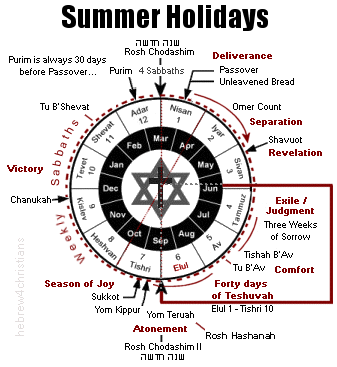|
Jewish Holiday Calendar
Note: For July 2014 site updates, please scroll past this entry....
In the summer there occurs a three week period of mourning that begins with the Fast of Tammuz and ends with Tishah B'Av. The last nine days of this three week period (i.e., from Av 1 until Av 9th) are days of increased mourning. However, after this somber time, the romantic holiday of Tu B'Av, the 15th of Av occurs. Summer ends with the 30 days of the month of Elul, a yearly season of teshuvah (repentance) that anticipates Rosh Hashanah and the fall holidays. The 30 days of Elul are combined with the first 10 days of the month of Tishri to create the "Forty Days of Teshuvah" that culminate with Yom Kippur.
The Summer Holidays:

Note that in accordance with tradition, the following holiday dates begin at sundown:
- Month of Tammuz (begins Friday, June 27th, 2014)
- Month of Av (begins Sunday, July 27th, 2014)
- Month of Elul (begins Monday, August 25th, 2014)
July 2014 Updates
Your greatest need...

[ The following entry is related to our Torah portion this week, parashat Devarim... ]
07.31.14 (Av 4, 5774) From our Torah this week we read: "For the LORD your God has been with you. You have lacked nothing" (Deut. 2:7). With God you have everything you need; without Him, you will never be truly satisfied. "Our hearts are restless until they find their rest in Thee," which is to say that the merry-go-round of desire for things of this world is ultimately vain and unfulfilling. Indeed, it is slavery to be attached to unslakeable desire; it is madness to restlessly desire more and more. God has set eternity within our hearts (Eccl. 3:11), a hunger that only heaven can fulfill, but we try to find happiness with the trinkets and junk of this passing realm.... When the LORD is with us – and when we dwell in the simplicity of that reality – we lack nothing: "For the LORD God is a sun and shield; the LORD bestows favor and honor; no good thing does he withhold from those who walk uprightly. O LORD of hosts, blessed is the one who trusts in you" (Psalm 84:11-12).
כִּי שֶׁמֶשׁ וּמָגֵן יְהוָה אֱלהִים
חֵן וְכָבוֹד יִתֵּן יְהוָה
לא יִמְנַע־טוֹב לַהלְכִים בְּתָמִים
יְהוָה צְבָאוֹת אַשְׁרֵי אָדָם בּטֵחַ בָּךְ
ki · she·mesh · u'ma·gen · Adonai · Elohim
chen · ve'kha·vod · yit·ten · Adonai
lo · yim·na · tov · la·cho·le·khim · be'ta·mim
Adonai · Tze·va·ot · ash·rei · a·dam · bo·te·ach · bakh

"For the LORD God is a sun and shield;
the LORD bestows favor and honor;
no good thing does he withhold from those who walk uprightly.
O LORD of hosts, blessed is the one who trusts in you"
(Psalm 84:11-12)

Moving Toward the Center...
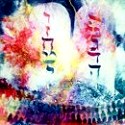
[ The following entry is related to our Torah portion this week, parashat Devarim... ]
07.31.14 (Av 4, 5774) From our Torah portion this week we read: "'You have been traveling around this mountain country long enough. Turn northward" (Deut. 2:3). Around and around, covering the same ground; learning the rules of behavior, focusing more on "the what" than on "the how." The sages say that "turning north" (צָפוֹן) means turning to that which is deeper, hidden (צָפוּןֵ). Look within and attend to the secret sins, the unconscious ways that prompt us to revisit old patterns of behavior: "Keep back your servant also from presumptuous sins; let them not have dominion over me" (Psalm 19:13). Examine yourself to see whether you are in the faith: ἑαυτοὺς δοκιμάζετε - test yourselves (2 Cor. 13:5). Consider what gives life to your everyday choices and attitudes. God calls us to love Him in wholeness, and that means in the hidden recesses of the heart (Matt. 6:6).
There is a tension between self-acceptance, the unconditional love of God, and the duty to consecrate ourselves: "Work out your own salvation with fear and trembling, for it is God who works in you, both to will and to work for his good pleasure" (Phil. 2:12-13). The sages says that every desire is ultimately rooted in a hunger for life, for God, and for holiness – though it is your responsibility to uplift the desire, to sanctify it, and to order your loves by making them express your hunger for heaven (1 Cor. 10:31).
Secret of the Most High...

07.30.14 (Av 3, 5774) One of the great Hebrew names of God is El Elyon (אֵל עֶלְיוֹן), often translated as God "Most High." Notice that the name "Elyon" (עֶלְיוֹן) comes from a root word (עָלָה) that means "to ascend." For instance, an "olah offering" (עלָה) is a whole burnt offering that ascends upward to heaven, and "aliyah" (עֲלִיָּה) means "going up" to the land of Israel. The word "Elyon," then, expresses the truth that the LORD is the Ascended One who overcame all the powers of hell and utterly vanquished death's power. In other words, Elyon is a name for the LORD our God Yeshua. It is written: "He who abides in the secret of the Most High will dwell in the shadow of the Almighty" (Psalm 91:1). The one who "abides" in the secret of the Most High dwells in an ascended place of rest – being lifted up above the surrounding madness of this fallen world of flux and shadows. The Hebrew word is related to the word to lodge or "sleep" (לִין), connecting it with death and resurrection. By dwelling in the death and resurrection of Yeshua, God will shield you with His Presence and make evil powerless before you... When you "abide" in the secret of Elyon - the Ascended One - you are concealed by the dark clouds of His Glory, and the Presence of Shaddai (שַׁדַּי), the Sustaining One, will overshadow you... The LORD will save you from the ensnaring trap and from the devastating pestilence (Psalm 91:3).
ישֵׁב בְּסֵתֶר עֶלְיוֹן
בְּצֵל שַׁדַּי יִתְלוֹנָן
אמַר לַיהוָה מַחְסִי וּמְצוּדָתִי
אֱלהַי אֶבְטַח־בּוֹ
yo·shev · be·se·ter · El·yon
be·tzel · Shad·dai · yit·lo·nan
o·mar · ladonai · mach·si · u·me·tzu·da·ti
E·lo·hai · ev·tach · bo

"He who dwells in the secret of the Most High
will abide in the shadow of the Almighty.
I will say to the LORD, "My refuge and my fortress,
my God, in whom I trust."
(Psalm 91:1-2)

Download Study Card
Since God hides Himself from the proud (Isa. 45:15), we must humbly seek His face to enter into the place of His holy concealment in all things. God is Elyon – High above - but He dwells "with the lowly and the broken of heart" (Isa. 57:15). Therefore the LORD our God is called Shaddai (שַׁדַּי) – our Sustainer, Provider, Refuge, Fortress, our Home. Just as we can be surrounded by the "shadow of death" (tzal mavet), so we can be surrounded by the "shadow of Shaddai" (tzal Shaddai). Like a powerful eagle brooding over her chicks, so Shaddai covers you with wings of protection (Psalm 91:4).
We find shelter in the love and kindness of the LORD our God. The Midrash Ruth says: "See how great is the power of kindhearted and charitable persons! They do not take shelter with the dawn, nor at the ends of the earth, nor under the wings of angels, of cherubs, or of eagles, but with the One who spoke the world into being!" As it is written: "How precious is your lovingkindness, O God! Therefore the children of mankind take refuge under the shadow of your wings" (Psalm 36:7).
Be encouraged dear friend who trusts in Yeshua...
Are you willing to ascend?
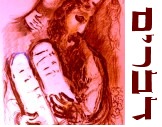
[ The following entry is related to our Torah portion this week, parashat Devarim... ]
07.30.14 (Av 3, 5774) From our Torah portion this week (i.e., Devarim) we read: "But you were not willing to ascend (וְלא אֲבִיתֶם לַעֲלת), but became bitter (מָרָה) against the Word of the LORD your God" (Deut. 1:26). Moses' rebuke was not that the people were afraid to conquer the land as much as that they had lost heart and no longer desired to take hold of God's promise. The people gave up their dream; they forsook their hope; and they had lost the "devotion of their youth, their love as a bride, how they followed the LORD in the desert, into a land not sown" (Jer. 2:2). The people's failure was on two levels: First they lapsed in faith by abdicating trust in God's word, and second, they had lost the passion of their first love. In light of this, the sages say that the greater problem was that of losing heart, since the heart directs the will to believe in the miracle of God, or not...
Moses' rebuke of the people's heart condition recalls the sober warning Yeshua gave to the Ephesian believers: "I know your works, your toil and your patient endurance, and how you cannot bear with those who are evil, but have tested those who call themselves apostles and are not, and found them to be false. I know you are enduring patiently and bearing up for my name's sake, and you have not grown weary. But I have this against you, that you have abandoned the love you had at first. Remember therefore from where you have fallen; repent, and do the works you did at first. If not, I will come to you and remove your menorah from its place, unless you repent" (Rev. 2:2-5). Likewise the author of the Book of Hebrews commented: "And to whom did he swear that they would not enter his rest, but to those who were disobedient? And with whom was he provoked for forty years? Was it not with those who sinned, whose bodies fell in the desert? So we see that they were unable to enter because of unbelief" (Heb. 3:17-19). The question of our faith is essential: "It is a fearful thing to fall into the hands of the living God" (Heb. 10:31).
Seeking Things Above...

[ The theme of teshuvah (repentance, turning to God) is central during the Three Weeks... ]
07.30.14 (Av 3, 5774) "How long will you go limping between two different opinions? If the LORD is God, follow him; but if Baal, then follow him" (1 Kings 18:21). These words of Eliyahu ha-navi (Elijah the prophet) are meant for us to hear today, during this season of teshuvah leading up to Tishah B'Av. We are being called to make up our minds (metanoia) and turn (shuv) to the LORD. After all, what is more important to you than your relationship with the LORD God of Israel? Is there anything more important than this?
To de-cide means to "cut away" other options. Yeshua tells us to take up the cross and die because that which is dead no longer suffers from ambivalence and carnal inner conflict... There are no "half-measures" here; when we accept that we have already been crucified with Messiah, we confess that our true life is not here, in this world, but is bound up in Him, and that God alone is our ultimate concern and end. In that sense, the life we now live in the flesh "catches up" with the truth and power that God has decreed for our salvation.
We are to know ourselves in terms of what God has done for us, and not as the world defines us (2 Cor. 5:16). "If then you have been raised with Messiah, seek the things that are above (τὰ ἄνω ζητεῖτε), where the Messiah is seated at the right hand of God; focus your thoughts on the things above - not on things here on earth - for you have died, and your life has been hidden with Messiah in God" (Col. 3:1-4).
If we are spiritually identified with Yeshua, we are "dead" to this age (olam hazeh) and awakened to a realm that transcends the appeals of the flesh (olam habah). We no longer live chayei sha'ah (חַיֵּי שָׁעָה, "fleeting life") but chayei olam (חַיֵּי עוֹלָם, "eternal life"). The aorist verb "you have died" indicates "you have died once for all," that is, that this is a condition granted by the power and agency of God on your behalf. You don't "try to die" to the flesh; you accept what God has done by killing its power over you through Yeshua...
You are dead to this world; you are dead to sin's power; you are set free and no longer enslaved to the deception of the worldly matrix, etc. Now you are made alive to an entirely greater and more powerful order and dimension of reality, namely, the spiritual reality that is not disclosed to the vanity of this age. Therefore we are to consciously focus our thoughts (φρονέω) on the hidden reality of God rather than on the temporal world that is passing away: "For we are looking not to the things that are seen but to the things that are unseen. For the things that are seen are transient (i.e., "just for a season," καιρός), but the things that are unseen are eternal" (2 Cor. 4:18).
Fight the Good Fight...
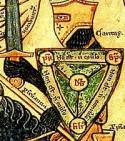
07.29.14 (Av 2, 5774) Now more than ever: Choose to fight (ἀγωνίζομαι - "agonize," "struggle") another day. Do not yield to despair or give place to anxiety. Press on and keep fighting the "good fight" of faith (1 Tim. 6:12). You infinitely matter to heaven; your life has great value; you are significant and you are truly loved by our Heavenly Father... There is a "future and a hope" reserved for you (Jer. 29:11); there is "a white stone, and on that stone will be written a new name that no one can understand except the one who receives it" (Rev. 2:17). This promise is given to the "one who conquers" (Τῷ νικῶντι) because of the love and grace of our God. Indeed, by faith we are made "more than conquerors" (lit. "hyper conquerors," ὑπερνικῶμεν) through the Messiah and his love for us (Rom. 8:37).
In our struggle against the darkness, there is an end coming, so don't let your heart grow numb. Never give up hope. God has promised: "I will give you a new heart (לֵב חָדָשׁ), and a new spirit (רוּחַ חֲדָשָׁה) I will put within you. And I will remove the heart of stone (לֵב הָאֶבֶן) from your flesh and give you a heart of flesh" (Ezek. 36:26). Receive God's promise for your soul, since His healing love is what you really need...
Note: I want to publicly praise God for his healing and to express my thanks to you for your kind prayers. My foot is feeling better and I am able to walk without much pain! Baruch Attah Adonai Eloheinu Melech ha'olam, ha-gomel le'chayavim tovot sheg'malani kol tov: "Blessed are You, LORD our God, King of the universe, who bestows good to the unworthy, even as He has bestowed to me every good" (traditional blessing thanking God for healing).
Eyes of the Heart...
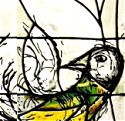
07.29.14 (Av 2, 5774) The Hebrew word for "seeing" (ra'ah) is related to the word for "fear" (yirah), suggesting that when we really see life as it is, we will be filled with wonder and awe over the glory of it all. Every bush will be aflame with the Presence of God and the ground we walk upon shall suddenly be perceived as holy (Exod. 3:2-5). Nothing will seem small, trivial, or insignificant. It is in this sense that we are to serve the LORD with "fear and trembling" (φόβοv καὶ τρόμοv), that is, with an inner awareness of the sanctity and sacredness of life itself (Phil. 2:12-13). Da lifnei mi atah omed. Sin puts us to sleep, numbs our minds and hearts, and blinds us to the radiance of divine revelation. When we see life as it is, with the "eyes of the heart" (Eph. 1:18), we will be filled with wonder and awe over the glory of it all. "Fearing" (יִרְאָה) and "seeing" (רָאָה) will be linked and unified.
Blessing for Darkness...
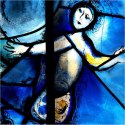
07.29.14 (Av 2, 5774) "If I say, surely darkness covers me ... the night shines as the day; nothing hides from your radiance" (Psalm 139:11-12). We have to trust that God is in our darkness, in the silence, in the unknown... God sees in your darkness and is present there, too. When you feel alone, when you feel abandoned, like an unbridgeable gulf lay between you and all that is good; when you feel like you want to scream but are afraid that even then no one would hear, may the LORD shine His light upon you...
גַּם־חשֶׁךְ לא־יַחְשִׁיךְ מִמֶּךָ
וְלַיְלָה כַּיּוֹם יָאִיר
כַּחֲשֵׁיכָה כָּאוֹרָה
gam · cho·shekh · lo · yach·shikh · mi·me·ka
ve·lai·lah · ka·yom · ya·ir
ka·cha·she·khah · ka·o·rah

"The darkness is not made dark to you;
but the night shines as the day:
as the darkness so is the light...
(Psalm 139:11)

"For it is you who light my lamp; the LORD my God outshines my darkness" (Psalm 18:28). There is "depression," and there is the dark night of the soul, and these are different matters, though they may overlap... "Hope deferred makes the heart sick." The dark night of the soul is an experience of trusting God in the darkness yet has a spiritual direction and end. We walk through this darkness with God and learn from him even there....
Moses' Miraculous Words...

[ The following entry is related to our Torah portion this week, parashat Devarim... ]
07.28.14 (Av 1, 5774) The midrash says that though Moses "stammered" and was "kevad peh" (heavy of mouth), he was empowered to speak fluently whenever the Holy Spirit moved him. Sefer Devarim (the Book of Deuteronomy) is unique among the five books of Torah because it represents Moses' great farewell appeal to follow the LORD bekhol levavkha, "with all of your heart" (Deut. 6:5). In this final book of Torah, Moses - who once described himself as lo ish devarim (לא אִישׁ דְּבָרִים) "a man of no words" (Exod. 4:10), speaks some of the moving words of all of the Holy Scriptures, eloquently calling us to embrace the truth of Torah, to walk in God's love, and to await the final redemption...
Anticipating Tishah B'Av...
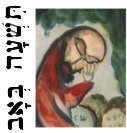
[ The sorrowful holiday of Tishah B'Av begins Monday, August 4th (at sundown) and runs 25 hours, that is, until an hour after sundown the following day... ]
07.28.14 (Av 1, 5774) We are in the midst of the "Three Weeks of Sorrow" that began with the Fast of Tammuz and ends with the fast of Tishah B'Av. Spiritually, these three weeks are marked by a renewed called for teshuvah (repentance), and the weekly readings from the prophets all warn about imminent judgment from heaven. Because this is a somber time for the Jewish people, it is customary not to schedule weddings or other joyous events during this time of year. Indeed, among the very Orthodox, the last nine days of the three weeks are the most rigorous and solemn. Beginning on the first day of the month of Av, traditional mourning customs are practiced in anticipation of the great fast of Tishah B'Av, when the Book of Lamentations (Megillat Eichah) is plaintively recited during the evening service.
The month of Av is traditionally regarded as the most tragic in the Jewish calendar. On the first day of this month, Aaron (the first High Priest of Israel) died (Num. 33:38), which was regarded as a prophetic omen of the future destruction of both of the Temples on the Ninth of Av. This year the new moon of Av began Sunday, July 27th at sundown...
Since Rosh Chodesh Av marks the time of mourning for Zion, we humbly ask the LORD to help us prepare for the coming time of teshuvah:
יְהִי רָצוֹן מִלְּפָנֵיךָ יהוה אֱלהֵינוּ וֵאלהֵי אֲבוֹתֵינוּ
שֶׁתְּחַדֵּשׁ עָלֵינוּ חדֶשׁ טוֹב בַּאֲדנֵינוּ יֵשׁוּעַ הַמָּשִׁיחַ אָמֵן
ye·hi · ra·tzon · mil·fa·ne·kha · Adonai · E·lo·hei·nu · ve·lo·hei · a·vo·tei·nu
she·te·cha·desh · a·lei·nu · cho·desh · tov · ba'a·do·nei·nu · Ye·shu·a · ha·ma·shi·ach · A·men

"May it be Your will, LORD our God and God of our fathers,
that you renew for us a good month in our Lord Yeshua the Messiah.
Amen."

Download Study Card
The month of Av begins the mourning phase of the "Three Weeks of Sorrow." During the final nine days of these three weeks - beginning with Rosh Chodesh Av (i.e., Av 1) and ending on Tishah B'Av (i.e., Av 9) - observant Jews will begin emotionally preparing for the fast of Av. It is common to confess the sins in our lives that contribute to the lack of God's Presence in our midst. Typically marriages are not held during this time, and many Jews deliberately refrain from ostensibly pleasurable activities, such as listening to music, dancing, taking vacations, and sometimes even shaving. In fact, most Orthodox Jews will refrain from any activity that might require the recitation of the Shehecheyanu blessing.
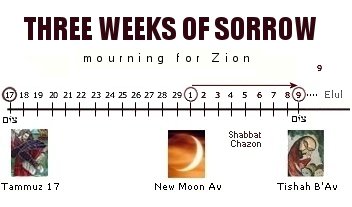 |
Among observant Jews, Tishah B'Av is regarded as the saddest day of the Jewish year (even sadder than Yom Kippur) since it was on this date that the LORD tragically decreed that the original generation rescued from Egypt would be denied entrance into the Promised Land on account of the egregious Sin of the Spies. This event was considered prophetic of other tragedies of Jewish history (based on the principle: מַעֲשֵׂה אֲבוֹת סִימָן לַבָּנִים / ma'aseh avot siman labanim: "The deeds of the fathers are signs for the children"), and indeed on precisely this date both of the Temples were destroyed and the Jewish people suffered exile. The purpose of the nine days of mourning is to instill a sense of teshuvah (repentance) in preparation for the 25 hour fast of on the Ninth of Av.
Expressing Anger to God...

[ The following entry is related to our Torah portion this week, parashat Devarim... ]
07.28.14 (Av 1, 5774) From our Torah portion this week (Devarim) we read: "You were not willing to go up but rebelled at the word of the LORD your God. And you murmured in your tents and said, 'Because the LORD hates us he has brought us out of the land of Egypt...'" (Deut. 1:26-27). We may decry the childish insolence of the people, we lament their lack of faith, and yet God was still speaking through Moses to Israel... The sages ask whether we can ever be justfiably angry at God, and answer that yes we can, because otherwise we could never love Him "bekhol levavkha," with all our heart (Deut. 6:5). Indeed, how can we claim to love God if we withhold the truth, lie to ourselves, and attempt to hide who we really are from Him? If you are angry at God, he already knows, so why the pretense? Being angry with God is part of being a real person in a real relationship with Him, and allowing yourself to express the truth of your heart to him is a sign of trust. God can "handle" the darker storms of your heart: trust Him to heal you this hour.
God, you help complete strangers - so why don't you help me? - Yiddish Proverb
Parashat Devarim...

07.27.14 (Tammuz 29, 5774) Our Torah reading for this week is the very first portion from the Book of Deuteronomy (i.e., Devarim: דְּבָרִים), which is always read on the Sabbath that immediately precedes the doleful holiday of Tishah B'Av (תשעה באב). In Jewish tradition, this special Sabbath is called "Shabbat Chazon" (שַׁבַּת חַזוֹן), "the Sabbath of Vision," since the Haftarah that is read (Isa. 1:1-25) comes from the vision of the prophet Isaiah regarding the destruction of the Holy Temple in Jerusalem. In Jewish tradition and liturgy, teshuvah (repentance) and viduy (confession of sin) are the themes of this preparatory Sabbath.
Personal update: My left foot is so swollen that I can't walk without limping, and the pain is severe... I am hoping to see a doctor for an xray this evening.
God's Word of Love...

07.25.14 (Tammuz 27, 5774) In moments of testing, and especially in your failures, heed the voice of God's compassion (מילות רחומות). Use the "good eye" (עַיִן טוֹבָה) to see how the Spirit draws you close in your weakness, calling you to return from your self-imposed exile, welcoming you back to the Divine Presence. Note that the good eye (ayin tovah) is also called the "beautiful eye" (עין יפה), since it sees beauty even in ashes... Do not turn away from God's plea for your comfort; know that God is love (Exod. 34:6; 1 John 4:16); He is light (1 John 1:5), and He is forever with you as your Savior (Isa. 41:10; Matt. 28:20). Using the "beautiful eye" means refusing to think evil about others (including yourself); it "does not impute the bad" - οὐ λογίζεται τὸ κακόν (1 Cor. 13:5) but rejoices in the truth – even if that truth is found only in the hope of a future good (1 Cor. 13:7; Rom. 8:24). Yeshua told us, "The eye is the lamp of the body. So, if your eye is good (i.e., ἁπλοῦς, sincere, heartfelt, compassionate), then your whole body will be full of light" (Matt. 6:22).
כִּי־טוֹב חַסְדְּךָ מֵחַיִּים
שְׂפָתַי יְשַׁבְּחוּנְךָ
ki · tov · chasdekha · me'chayim
sefatai · yeshabechunkha

"Because your lovingkindness is better than life,
my lips will praise you."
(Psalm 63:3)

Download Study Card
Loving God's Torah...

07.25.14 (Tammuz 27, 5774) "Oh how I love your Torah! It is my meditation all the day long" (Psalm 119:97). The sages note that the evil inclination (יֵצֶר הָרָע) can fool a person into thinking he fears God and loves Torah, when such is not case (we can so identify with what we "ought" to be that we deny what we really are). The test is this: What do you talk about? What occupies your passion? What is your ultimate concern? What is your chief delight? King David put aside concerns of ambition and worldy success and made God's truth the focus of his attention: "One thing have I asked of the LORD, that will I seek after: that I may dwell in the house of the LORD all the days of my life, to gaze upon the beauty of the LORD and to inquire in his temple" (Psalm 27:4).
מָה־אָהַבְתִּי תוֹרָתֶךָ
כָּל־הַיּוֹם הִיא שִׂיחָתִי
mah · a·hav·ti · to·ra·te·kha
kol · ha·yom · hi · si·cha·ti

"Oh how I love your Torah;
It is my meditation all the day."
(Psalm 119:97)
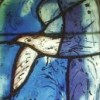
Hebrew Study Card
This verse begins the "Mem section" of the Psalm 119 acrostic. Mem is the letter of "water" (mayim), symbolizing the "spring" of the Torah. In traditional soferut (scribal arts), the letter Mem (מ) is formed from two parts: a Vav (ו) and a Kaf (כ), the gematria of which equals 26, the same value for the sacred Name YHVH (יהוה). The Torah (תּוֹרָה) is central to the revelation of the LORD, just as Yeshua is forever "the Voice of the Living God speaking from the midst of the fire" (Deut. 5:26, Matt. 17:1-3).
Note that the phrase "my meditation" (שִׂיחָתִי) comes from the Hebrew word siyach (שִׂיחַ), meaning to meditate, ponder, to rehearse or "go over in one's mind," to talk about, etc. In Proverbs 6:20-22, this word is used to refer to the inward voice heard by a son who has bound his parent's teachings to his heart: "When you walk, they will lead you; when you lie down, they will watch over you; and when you awake, they will talk with you (תְשִׂיחֶךָ)." Indeed the same root is used to describe God's thought (שֵׂחַ) in Amos 4:13 (cp. 1 Cor. 2:16).
The Hebrew word "Torah" (תּוֹרָה) is often rendered as "law" in many English translations, but this is unfortunate, since the word comes from the root word yarah (יָרָה), which means "to shoot an arrow" or "to hit the mark." Understood in light of this, Torah does not so much denote a set of rules that (legalistically) prescribe behavior, as it reveals a sense of direction or aim in the way of life (הַדְרָכָה). Loving Torah, then, means earnestly appreciating the gracious revelation of the Lord as He instructs us regarding who we are and how we are to live before Him as His beloved children...
Note: For more on this important topic, see "Delighting in Torah."
Journey Back Home...

[ The following is related to our Torah reading for this week, Parashat Masei... ]
07.25.14 (Tammuz 27, 5774) "These are the journeys..." (Num. 33:1). The midrash says that the forty two encampments listed in this Torah portion symbolize the journey from exile back to paradise. The first four letters of the four opening words (אֵלֶּה מַסְעֵי בְנֵי־יִשְׂרָאֵל) allude to the four exiles of the Jewish people: the Aleph (א) stands for Edom, that is, Rome and the present-day exile; the Mem (מ) stands for the Medes, that is, the Persian exile under Ahasuerus; the Bet (בּ) stands for Babylonia, and the the exile under Nebuchadnezzar; and the Yod (י) stands for Yavan (Greece), that is, the assimilation and exile that happened under Alexander the Great. Our Torah portion is always read during the Three Weeks of Mourning for the destruction of the Temple (17 Tammuz - 9 Av) to remind us that despite the exiles and wanderings in this life, ultimately we are on our way back home...
Torah of Teshuvah...
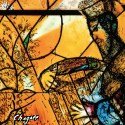
07.24.14 (Tammuz 26, 5774) Perhaps you (like me) once learned Psalm 19:7 as, "The law of the LORD is perfect, converting the soul." However, the Hebrew text might better be translated as, "The instruction (i.e., Torah) of the LORD is perfect, returning the soul." This is the message of teshuvah (תְּשׁוּבָה), or "repentance." We turn away from ourselves to discover that only the love of God given in Yeshua gives life to our dead hearts. Teshuvah is therefore first of all a matter of faith, of trusting in the miracle of God. And though it is indeed a great gift from heaven, it requires that we pass through the "narrow gate" of humility by confessing the truth about who we are (Matt. 7:13). We turn away from our pride; we acknowledge our inner poverty, our neediness, and we mourn over the loss and hurt caused by our sin. Teshuvah turns away from our attempts to defend or justify ourselves and instead turns to God to heal our separation from Him (Rom. 8:3-4). By faith God buries our old nature and transforms us into a new creation (2 Cor. 5:17).
תּוֹרַת יְהוָה תְּמִימָה מְשִׁיבַת נָפֶשׁ
עֵדוּת יְהוָה נֶאֱמָנָה מַחְכִּימַת פֶּתִי
torat · Adonai · temimat · meshivat · nafesh
eidut · Adonai · ne'emanah · machkimat · peti

"The instruction of the LORD is perfect, returning the soul
The testimony of the LORD is reliable, making wise the simple."
(Psalm 19:7)

Download Study Card
Come as you are...

07.24.14 (Tammuz 26, 5774) Yeshua said: "Come to me, all who labor and are heavy laden, and I will give you rest. Take my yoke upon you, and learn from me, for I am gentle and lowly in heart, and you will find rest for your souls" (Matt. 11:28-29). When he said, "Live in me, and I will live in you" (John 15:4), he didn't insist that you first be found worthy or made good; no, he set no other condition than that of trust: "Now are you clean through the word which I speak" (John 15:3). The separation is gone; God has made the way past your shame; he has overcome all your inner lostness. You are invited to come, so come just as you are, come without delay, but come trusting that you are entirely welcome because of who Yeshua is and what he has done for you. "The LORD is good to those who trust in him, to the one who seeks him" (Lam. 3:25).
טוֹב יְהוָה לְקוָו לְנֶפֶשׁ תִּדְרְשֶׁנּוּ
tov · Adonai · lekovav · le'nefesh · tidreshenu

"The LORD is good to those who trust in Him,
to the one that seeks him"
(Lam. 3:25)
The Sanity of Boundaries...

[ The following is related to our Torah reading for this week, Parashat Masei... ]
07.24.14 (Tammuz 26, 5774) "The land .. defined by its boundaries" (Num. 34:2). God knows that we all need a sense a space for ourselves, and that's why he defines limits for our lives. Boundaries - whether physical, political, or emotional - help us respect ourselves and others; they are integral to the idea of "inheritance." A city without walls is easily overrun, and so are our souls if we cannot say "no" to others or learn to restrain our impulses (Prov. 25:28). Boundaries give us a sense of place and direction; they help us stay centered, focused, and 'at home' with ourselves. Those who violate the boundaries of others violate the commandment not to steal, and therefore they deny the One who has ordained the sanctity of human life (Deut. 27:17).
עִיר פְּרוּצָה אֵין חוֹמָה
אִישׁ אֲשֶׁר אֵין מַעְצָר לְרוּחוֹ
'ir · pe·ru·tza · ein · cho·mah
ish · a·sher · ein · ma'e·tzar · le·ru·cho

"Like a city breached without walls,
is a person who lacks self-control."
(Prov. 25:28)
Boundaries imply mutual respect. We not only establish our own personal boundaries, but respect and honor the boundaries of others. Notice that the person who violates the boundaries of others is likened to a breached city without walls: a lack of self-control dissolves a sense of self. We are to respect others as we want to be respected, and if we fail to do so, we will become victims of our own destructive impulses. As we treat others, so we treat ourselves... Indeed, those who violate and abuse the space of other people make themselves vulnerable, weak, and are enslaved to further passions they cannot control.
The Heart of Truth...

07.24.14 (Tammuz 26, 5774) "If we ask anything according to God's will, he hears us" (1 Jn 5:14) which is to say that in heaven there is only the language of truth, and truth is the language of heaven. Those who pray insincerely abuse the gift of speech, and such language is not understood in heaven... God speaks to us in the language of faithfulness, hope, and love (1 Cor. 13:13). Kierkegaard wrote, "No person is saved except by grace; but there is one sin that makes grace impossible, and that is dishonesty; and there is one thing God must forever and unconditionally require, and that is honesty." Confession means "saying the same thing" about ourselves that God says - and that means not only acknowledging our sins, but also affirming that we are loved by God. "Love hopes all things" (1 Cor. 13:7), and therefore the language of truth is always spoken in hope. No truth about your sin is known apart from the love of God revealed in Yeshua our Messiah.
Personal Note: Thank you for your prayers, friends; the fever broke last night, though I am now limping because of severe pain and tendonitis in my left foot... refaeini Adonai ve'eirafei
The Journey of Torah...
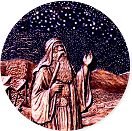
07.23.14 (Tammuz 25, 5774) "Moses wrote down their starting places, stage by stage, by Word of the LORD" (Num. 33:2). The sages here say that Moses wrote of the journey out of slavery to receive the laws of God because the people needed the various laws and rules to learn to be attached to God, though at first this was not the way. Our father Abraham received the meaning of the Torah before it was given at Sinai (Gen. 26:5), and through Abraham it was revealed that the essence of Torah is trust in God (Gen. 15:6). It was because of the harshness of the exile in Egypt that the people needed to be instructed as children to understand God's truth and moral reality (Gal. 3:24-25). The beginning and end of true Torah, however, was a matter of faith – trusting in the redemptive message of God based on sacrificial love (Gen. 3:15; 22:1-14). The Passover was offered before the Sinai revelation. In that sense, the giving of the law at Sinai was a provisional matter meant to teach the people about salvation that comes through faith in the Lamb of God (Rom. 10:4).
The later sages characteristically envision the forty-two stations of the people as a refining sequence that was designed to shape the inner character of Israel. The journey is depicted as a circular one: we are given life, breath, and Torah, and our mission is to work them out in our lives, offering them back to God as their source and end (Phil. 2:12-13).
Passages of Faith...

07.23.14 (Tammuz 25, 5774) "These are the journeys of the children of Israel" (Num. 33:1), and what follows is a list of obscure places in the desert. The stories of Torah are parables for us, meant to provide insight into the life of faith: ma'aseh avot siman labanim: "The deeds of the fathers are signs for the children." All our journeys, even those to places of obscurity and trouble, are ultimately for the sake of heaven. We make our way through dry places, we learn to wait, to attach our hearts to God's greater vision and loving purposes... Everything that happens to us – life's burdens, struggles, tests, provide us with an opportunity to see God and learn to trust in Him (Rom. 8:28).
Deeper Torah of Love...

07.22.14 (Tammuz 24, 5774) The Kotzker Rebbe once said, "The prohibition against making idols includes the prohibition against making idols out of the commandments. We should never imagine that the whole purpose of the Torah is its outer form, but rather the inward meaning." Amen. The law is not an end in itself, but the means to the deeper end of freedom and life... In Mishkan, the sacrificial blood was placed over the tablets of the law (i.e., the blood sprinkled on the kapporet, or the "crown" of the Ark) that represented God's atonement for sin. The life is "in the blood," which represents God's passion, the deepest truth of Torah, the love that gives us life. And this is the message of the gospel itself, of course, since the blood of Yeshua passionately shed for our sake has opened up a new and everlasting way for us come alive and be rightly related to God (Heb. 9:12).
Man prays to God, but to whom does God pray? For what does He pray? Or do you think that the Almighty has no desires of His own, no yearning of heart? The sages of the Talmud believed that God indeed addresses himself: Yehi ratzon milfanai, "May it be acceptable before me, may it be My will, that my compassion overcome my anger, and that it may prevail over my justice when my children appeal to me, so that I may deal with them in mercy and in love" (Berachot 6a). This is the deeper unity of the Name YHVH (יהוה), the Savior and LORD, revealed to Moses after the sin of the Golden Calf (Exod. 34:6-7), and this is the essential meaning of the cross of Yeshua, where the LORD passionately "prayed within Himself" so that His compassion would overcome His fearful judgment for our sins.
Only the cross allows God's righteousness and mercy to "kiss" (Psalm 85:10; 89:14); only the cross reveals the true Holy of Holies where the blood was placed over the Ark of the Law; only the cross intimates the Inner Sanctum of God's heart. Because of the cross, a holy God is able to truly love and help the trusting sinner (Rom. 3:26). It is written: "Righteousness and justice are the foundation of your throne; steadfast love and faithfulness go before you" (Psalm 89:14). Because of Yeshua, God is vindicated as entirely just - and the Justifier of those who trust in His redemptive love (Rom. 3:24-26). Yeshua is the prayer of God the Father's on behalf of His children...
חֶסֶד־וֶאֱמֶת נִפְגָּשׁוּ צֶדֶק וְשָׁלוֹם נָשָׁקוּ
che·sed ve·e·met nif·ga·shu, tze·dek ve·sha·lom na·sha·ku

"Love and truth have met, righteousness and peace have kissed."
(Psalm 85:10)

Download Study Card
The will of God - His heart's yearning and desire - is for his children to receive his love (2 Pet. 3:9; 1 Tim. 2:4; John 3:16; Ezek. 18:23). As Yeshua prayed, "Holy Father, keep them in your Name, which you have given me, that they may be one, even as we are one... I in them and you in me, that they may become perfectly one, so that the world may know that you sent me and loved them even as you loved me" (John 17:11,23). Yeshua died on the cross to bear the shame for your sins, to be sure, but he did this so that you could be accepted and securely loved forever.... It is the love of God that is the goal of all things, after all. When Yeshua cried out, "It is finished" and breathed his last breath as He died for our sins upon the cross, the greatest exhalation of the Spirit occurred, the greatest sigh, the greatest utterance was ever declared. The sacrificial death of Yeshua for our deliverance was God's final word of love breathed out to those who are trusting in Him.
God's Eternal Name...
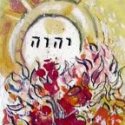
07.22.14 (Tammuz 24, 5774) God's Name is YHVH (יְהוָה), which means "He is Present." The Name is formed from the words hayah ("He was"), hoveh ("He is"), and yihyeh ("He will be"): הָיָה הוֶה וְיִהְיֶה, indicating God's omnipresence. Note that all the letters of the Name are "vowel letters," which mean they evoke breath and life. This is the Name revealed to Moses thousands of years before the advent of other religions (Exod. 3:14), and indeed it is the Name associated with the nishmat chayim (נִשְׁמַת חַיִּים), the "breath of life," imparted to Adam in the orchard at Eden (Gen. 2:4). It is therefore the original Name of God "breathed out" to mankind. It is the Name of the Serpent Slayer (Gen. 3:15). The Name Yeshua (יֵשׁוּעַ) means "YHVH saves." There is no other Savior beside Him, there is no other Name, there is no other LORD. "For I am the LORD your God, the Holy One of Israel, your Savior." Every knee shall bow and confess the truth (Isa. 45:23; Phil. 2:10). Only Jesus the Messiah can deliver you from the wrath to come (1 Thess. 1:10).
Peace for Bitterness...
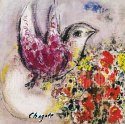
07.22.14 (Tammuz 24, 5774) Recall that when the people journeyed to Marah (מָרָה), they "could not drink the water because it was bitter" (Exod. 15:23; Num. 33:9). The Hebrew text, however, could be read, "they could not drink the water because they (i.e., the people) were bitter (i.e., כִּי מָרִים הֵם). The problem is often not "out there" but within the heart (Matt. 15:19-20). How we choose to see, in other words, says more about us than whatever happens in the world. The people refused to find the good in the journey, and consequently they became bitter and complained... That's the primary test, isn't it, to receive the given circumstances of life – including those moments of pain, emptiness, loneliness, and so on, and to seek out the hidden good of God's Presence.
הִנֵּה לְשָׁלוֹם מַר־לִי מָר
וְאַתָּה חָשַׁקְתָּ נַפְשִׁי מִשַּׁחַת בְּלִי
כִּי הִשְׁלַכְתָּ אַחֲרֵי גֵוְךָ כָּל־חֲטָאָי
hin·nei · le·sha·lom · mar · li · mar
ve·at·tah · cha·shak·ta · naf·shi · mi·sha·chat · be·li
ki · hish·lakh·ta · a·cha·rei · gev·kha · kol · cha·ta·ai

"Behold, for shalom - bitterness to me; bitterness;
but You have loved my soul from the pit of nothingness,
for You have cast all my sins behind Your back."
(Isa. 38:17)

In the verse quoted above, we read that God loves the soul "from the pit of nothingness," which pictures a loving father running to rescue his child from being swallowed alive by the earth (the Hebrew verb chashak (חָשַׁק) suggests pulling someone up out of a hopeless pit). That God casts all our sins behind His back figuratively denotes oblivion – and sins of the forgiven soul can are not brought to remembrance ever again. This is similar to the image given by Micah: "He will turn again, and have mercy on us: he will put away our iniquities: and he will cast all our sins into the bottom of the sea" (Micah 7:19).
We must be careful not to confuse cause and effect in the realm of the spiritual. After the original transgression of Adam and Eve, death became the root problem of the human condition, so to speak, with indwelling sin as its fruit (i.e., the "works of the flesh"). It is this inherited "spiritual death" that causes sin. To focus on outward behavior without first of all dealing with the underlying problem of death is therefore a spiritual misstep. It is to clean the outside of the cup or to wash the outside of a tomb in a vain attempt to disguise the truth about our unclean and dead condition. The good news is not that God wants to make bad people good, but rather wants to make dead people alive... The cure for spiritual death is to be reborn and to partake of the resurrected life of Yeshua.
Following Yeshua is not a sort of "moral reformation" or self-improvement program to make us acceptable to God. Yeshua did not die on the cross so that we could become followers of the rabbis... No! He is LORD and Master and we find salvation in His acts of deliverance done on our behalf and for our benefit. The temptation is always to go back to the law of sin and death (i.e., the principle of self-justification), but as Luther once said, "The sin underneath all our sins is the lie of the serpent that we cannot trust the love and grace of Christ and that we must take matters into our own hands."
"LORD, I need Thee every hour..." There never will be a time when we "get past" the need for God's grace given in Yeshua, since the only antidote to power of indwelling sin is the greater power of God's redeeming love within our hearts (1 John 3:8). The gospel is - not was - "the power of God for salvation (δύναμις θεοῦ ἐστιν εἰς σωτηρίαν) for everyone who believes" (Rom. 1:16); it is an ongoing source of power for our lives... Our identity is made secure in the finished work of the Messiah - we trust in His strength, not our own; it is "Messiah in you" that is the hope of glory (Col. 1:27). Just as we are given a new life entirely by means of God's grace, so we are also sanctified as we walk in that newness of life... "As you received Yeshua the Messiah the LORD, so walk in Him" (Col. 2:6). The focus is always on Yeshua and His righteousness and obedience... Every step of the way is a miracle and a wonder when we walk "in Messiah."
Personal Note: I am fighting a high fever, friends, with body aches, a rash, and restless pain... I feel dizzy and it is difficult to write or read at this time. "Heal me, O LORD, and I shall be healed; save me, and I shall be saved, for you are my praise" (Jer. 17:9).
Three Weeks of Sorrow...

07.21.14 (Tammuz 23, 5774) We are in the midst of the "Three Weeks of Sorrow" that began with the Fast of Tammuz... Spiritually, these three weeks are marked by a renewed called for teshuvah (repentance), and the weekly readings from the prophets all warn the people about imminent judgment from heaven. Because this is such a somber time for the Jewish people, it is customary not to schedule weddings or other joyous events during this time of year. Indeed, among the very Orthodox, the last nine days of the three weeks are the most rigorous and solemn. Beginning on the first day of the month of Av, traditional mourning customs are practiced in anticipation of the great fast day of Tishah B'Av, when the Book of Lamentations (Megillat Eichah) is plaintively recited during the evening service.
The Three Weeks of Sorrow (culminating in Tishah B'Av) undoubtedly marks the saddest and most solemn time of Jewish year, with great emphasis placed on the need for repentance and heartfelt cries for the salvation of the Jewish people. It is a time for us to remember Israel all the more in our prayers and ask for God's revelation of the Messiah.
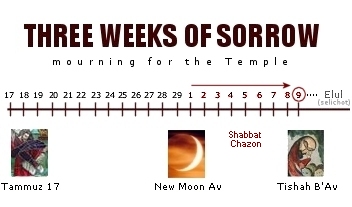 |
Dates During the Three Weeks of Sorrow:
Parashat Masei ("Journeys")...

07.20.14 (Tammuz 22, 5774) Our Torah reading for this coming Shabbat is parashat Masei ("journeys of," from masa (מַסַּע), "breaking camp," referring to a "stage" or camp site during the journey in the desert). Parashat Masei is the tenth (and final portion) of the Book of Numbers (סֵפֶר בְּמִדְבַּר). Indeed, since the Torah technically ends with the close of the Book of Numbers (Deuteronomy is mishneh Torah - a "retelling of Torah"), Masei is the final portion of the narrative of the entire Torah...
Note: Parashat Masei is traditionally read near the new moon of the month of Av, in anticipation of the nine days of mourning (for the lost Temple) that precede Tishah B'Av -- the saddest day of the Jewish calendar (see below for more information).
The Prophecy of Hope...
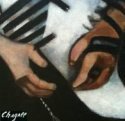
[ Words of blessing for the hope of our hearts.... Make them true, O LORD! Amen. ]
07.18.14 (Tammuz 20, 5774) Shema Yisrael, Adonai Eloheinu, Adonai echad: "Listen, O Israel, the LORD is our God; the LORD is one." Instead of thinking of the Shema (שְׁמַע) as a commandment to be externally obeyed, you can trust it as a prophecy about your inner life: "You shall love (וְאָהַבְתָּ) the LORD your God with all your heart, and with all your soul, and with all your might" (Deut. 6:5). Only God can quicken a dead heart, after all, and fill the soul with holy affections. Only the LORD can impart to us strength needed to take hold of promises as He writes His Torah upon our heart. As it is written, "For from him and through him and to him are all things. To him be glory forever" (Rom. 11:36).
וְאָהַבְתָּ אֵת יְהוָה אֱלהֶיךָ בְּכָל־לְבָבְךָ
וּבְכָל־נַפְשְׁךָ וּבְכָל־מְאדֶךָ
ve·a·hav·ta · et · Adonai · E·lo·he·kha · be·khol · le·vav·kha
u·ve·khol · naf·she·kha · u·ve·khol · me·o·de·kha

"You shall love the LORD your God with all your heart
and with all your soul and with all your might"
(Deut. 6:5)

Hebrew Study Card
God will take away your stony heart and give you a new heart, along with a new spirit to be willing to know His love, as it is written, "I will give you a new heart, and a new spirit I will put within you. And I will remove the heart of stone from your flesh and give you a heart of flesh" (Ezek. 36:26). Your new heart will be like Yeshua's own: open, accessible, flexible, trusting, sharing, emotionally alive, able to feel, pulsating with God's energy and power...
"You shall love (וְאָהַבְתָּ) the LORD your God with all your heart, and with all your soul, and with all your might" (Deut. 6:5). The promise is this: "you shall love," since love is what is most true about who you are... You shall love the LORD, since He is the Source and End of all real love. You will love the LORD more and more, as you grow ever closer to Him and one day will behold Him panim-el-panim, "face to face." You shall love the LORD with all your heart, which implies God has indeed given you a new heart to love Him with; and with all your soul, which implies that you are enabled to truly feel, and that your heart is made tender and sensitized; and with all your might - that is, with all your "muchness," your "substance," or that reality that makes you who you really are in the LORD... May the LORD fulfill this prophecy in you, friend.
Teshuvah of the Tongue...

07.18.14 (Tammuz 20, 5774) Our words reveal what is hidden within our hearts, and therefore - because words and thoughts are intimately connected - we must be very careful about how we think, and especially about how we esteem others. The Chofetz Chaim wrote that the foundational principle of shemirat ha-lashon (guarding our speech) is to esteem others in the best possible light. This involves hakarat tovah, that is, recognizing the good in others, and choosing to see with ayin tovah, a "good eye." It is better to judge favorably - even if we are in error - than it is to judge critically -- even if we are telling the truth. "Let the words of my mouth, and the meditation of my heart, be acceptable in your sight, O LORD my Rock and my Redeemer (Psalm 19:14).
Since the use of language presupposes the laws of logic, every utterance we make is grounded in transcendental meaning and significance.... In the world to come you will be shocked to understand that everything you thought, everything you said, and everything you did was given to you from above, and therefore has tremendous significance.
יִהְיוּ לְרָצוֹן אִמְרֵי־פִי
וְהֶגְיוֹן לִבִּי לְפָנֶיךָ יְהוָה צוּרִי וְגאֲלִי
yi·he·yu · le·ra·tzon · im·rei · fi
ve'heg·yon · lib·bi · le·fa·ne·kha · Adonai · tzu·ri · ve'go'a·li

"Let the words of my mouth and the meditation of my heart be acceptable to You,
O LORD, my rock and my redeemer."

Hebrew Study Card
May it please God to help us use our words for the purpose of strengthening and upbuilding (οἰκοδομὴν) one another (Eph. 4:29). May our words always be gracious and "seasoned with salt" (Col. 4:6). Dear Lord, awaken our hearts. As it is written: "Finally, brothers, whatever is true, whatever is honorable, whatever is just, whatever is pure, whatever is lovely, whatever is commendable, if there is any excellence, if there is anything worthy of praise, think about these things... and the God of peace will be with you" (Phil. 4:7-8), and, "whoever keeps His word, in him truly the love of God is perfected" (1 John 2:5).
Note: For more on this vital topic see the articles: Teshuvah of the Mind, and The Importance of Truth: Teshuvah and Moral Courage.
The Voice of Our Words....
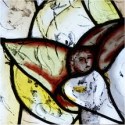
[ We are in the midst of the "Three Weeks of Sorrow" that culminates on Tishah B'Av... ]
07.18.14 (Tammuz 20, 5774) According to Jewish tradition, it was on Tishah B'Av (the Ninth of Av) when the people wept over the report of the spies, a lapse of faith so serious that it provoked God to decree that the very generation He redeemed from Egypt would die in the exile of the desert (Num. 13-14). As Moses later recounted this tragic event, he says something peculiar: "The LORD heard the 'voice of your words' (קוֹל דְבַרִים) and was angry..." (Deut. 1:35). The grammar here is unusual, for the text could have simply said, "the LORD heard your words," but the Torah adds something else, the idea of "emotional tone," or the manner, the words were spoken... Sometimes it's not so much what you say that matters, but how you say it. Words of the heart are expressed more by tone, the "voice of the words," than by the words themselves...
When we recite Shema, we do so bekhol levavkha (בְּכָל־לְבָבְךָ) - with all our heart, with all our soul, with all our might (Deut. 6:5). This is a cry from the heart that affirms God's truth. Our feelings are important and are given their voice, whether they are feelings of joy, gratitude, and so on, or feelings of doubt, despair, or fear. As Yeshua Himself said: "Would that you were either cold or hot, but because you are lukewarm - neither hot nor cold - I will spit you out of my mouth" (Rev. 3:15-16).
It's been said that if you don't know how to say something, say it loudly... The heart has its own voice regardless of the words we are able to articulate. For instance, if you love someone, then really love them and abhor being halfhearted. Being hot or being cold is better then being tepid, because then you are being honest, and honesty will always evoke a genuine response from heaven...
The End of Balaam...

07.18.14 (Tammuz 20, 5774) In our Torah portion this week (Mattot), the evil sorcerer Balaam finally met his end by being killed by the sword on the battlefield (Num. 31:8). Part of the message of his rancid life was that God sovereignly overturns the plans of the wicked for his own good purposes. Take comfort that while wicked Balaam secretly tried to curse the Israelites, the LORD took hold of his tongue, forced him to bless the people, and utterly confounded his evil intent. Praise the Name of the LORD, the principle still applies to this day: Though the princes of this world may conspire and scheme to curse us, the LORD will likewise overrule them and bring their devices to nothing.
כּל פָּעַל יְהוָה לַמַּעֲנֵהו
וְגַם־רָשָׁע לְיוֹם רָעָה
kol · pa·al · Adonai · la·ma·a·nei·hu
ve·gam · ra·sha · le·yom · ra·ah

"The LORD has made everything to answer to Him,
even the wicked for the day of trouble."
(Proverbs 16:4)
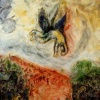
The Scriptures declare no weapon formed against us shall prosper (Isa. 54:17), and that the curse of the wicked is entirely powerless to bring us harm (Prov. 26:2). Ein od milvado: God is the only true power, and there is no enchantment or divination that will prevail against Israel (Num. 23:23). Satan is an impostor and a foiled usurper. As Yeshua told his followers, "Behold I give to you authority to tread on serpents and scorpions and over all the power of the enemy, and nothing shall by any means hurt you" (Luke 10:19). The lesson of Balaam, like the lesson of Haman given in the Book of Esther, is that those who curse God's people or attempt to foil His plans will destroy themselves....
Hope in Lament...
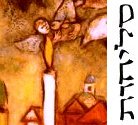
07.18.14 (Tammuz 20, 5774) Dear Lord, in the worst of our moments, thank you for seeing the Savior within us; thank you for heeding the hope that the Spirit imparts.... "When my heart was embittered, when I was pierced in heart, I was brutish and ignorant; I was like a beast toward you. Nevertheless, I am continually with you; You hold my right hand" (Psalm 73:21-23). Despite the lament, however, the psalmist affirmed that he was always with God - notwithstanding his ignorance, his complaint of heart, his doubts, fears, and so on... God is not driven away by our pain and confusion, but on the contrary, he takes us by the hand and will not let go: "It was I who taught Ephraim to walk; I took them up by their arms, but they did not know that I healed them" (Hos. 11:3).
Praise God that he sees the love of Yeshua for our sins...
The Foundation of Torah...
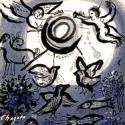
[ The following is related to our Torah reading for this week, Parashat Mattot... ]
07.18.14 (Tammuz 20, 5774) From our Torah this week we read: "This is the thing the LORD has commanded (זֶה הַדָּבָר אֲשֶׁר צִוָּה יְהוָה)... a man shall not break his word" (Num. 30:1-2). Note the connection here between "word" and "thing," between what we confess and what is real... Commitment to the truth is the foundation for all Torah. As Yeshua said, "For this purpose I was born and for this purpose I have come into the world -- to bear witness to the truth. Everyone who is of the truth listens to my voice" (John 18:37). We are bound by our commitment, and keeping the word authenticates its veracity. "This is the thing the LORD has commanded" – to accept Torah and to be truthful of heart.
Indeed, the sages have said that "the seal of God is truth," since the final letters of the three words that conclude the account of creation: בָּרָא אֱלהִים לַעֲשׂוֹת / bara Elohim la'asot: "God created to do" (Gen. 2:3) -- spell the word for truth (i.e., emet: אֱמֶת). Note that the "seal of God" is not just a matter of sincerity. It is rather a matter of being true in the sense that you are living it, you are "being with it," you are "one with it." Truth is a passion that informs all of the decisions you make in your life. You therefore embody truth and follow it in all your endeavors. In this sense Yeshua is the Truth, since in Him there was no mismatch between who He is and what He says. He is utterly trustworthy. His actions and speech are one and are entirely reliable. Yeshua is the "Seal of God," the one who authoritatively names of all creation, and His followers likewise should evidence this in their lives.
 |
Fruit of our lips...
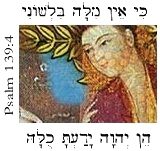
[ The following is related to our Torah reading for this week, Parashat Mattot... ]
07.17.14 (Tammuz 19, 5774) The sages connect the conclusion of last week's Torah portion (i.e., Pinchas), which concerns the offerings to be brought on the holy days (Num. 28-29), with the beginning of this week's Torah reading (i.e., Mattot), which concerns the sanctity of our speech, by saying that just as the offerings made to God were to be holy, so the words of our lips must be pure words expressing our heart's need for God. Indeed, the efficacy of our prayers is based on the sanctity of our speech, as it says, "The LORD is near to all who call on him, to all who call on him in truth" (Psalm 145:18), which implies that honesty and truthfulness mark the very language of heaven. Thus the Talmud admonishes that one who recites the Shema but does not "hear" the words he utters has not recited the Shema at all (Berachot 15a). As Kierkegaard rightly observed: "No person is saved except by grace; but there is one sin that makes grace impossible, and that is dishonesty; and there is one thing God must forever and unconditionally require, and that is honesty" (Psalm 51:6).
קָרוֹב יְהוָה לְכָל־קרְאָיו
לְכל אֲשֶׁר יִקְרָאֻהוּ בֶאֱמֶת
ka·rov · Adonai · le'khol · ko·re·av
le·khol · a·sher · yik·ra·u·hu · ve·e·met

"The LORD is near to all who call on him,
to all who call on him in truth."
(Psalm 145:18)

Hebrew Study Card
Pour out your heart (Psalm 62:8); God listens when you pray without pretense, expressing your heart's need, asking for strength to honor Him with your life... Amen. The Lord hears the cry of your heart. Act as if your choices have eternal significance; they really do; pray as if your life depends on it; it really does. Wake up; come alive! Let's boldly draw near to the throne of Grace to find help in our present hour of need (Heb. 4:16); let's cry out to God Most High (לֵאלהִים עֶלְיוֹן), to the very One who will fulfill his purpose for us (Psalm 57:2).
Inner to Outer Reality...

07.17.14 (Tammuz 19, 5774) In the Shema we recite: "these words that I command you this day shall be 'on your heart (עַל־לְבָבֶךָ),' and you shall repeat them diligently to your children (וְשִׁנַּנְתָּם לְבָנֶיךָ)," which reveals the necessary order: When the words of Torah are made a part of your heart, your children will be taught in the truth. The same approach must be used regarding the message of the Messiah, too: "Go into all the world and preach the gospel, and sometimes use words."
Note: "And you shall repeat them" i.e., וְשִׁנַּנְתָּם comes from שָׁנָה, "repeat," do again, and from which the Hebrew word shanah, "year" also derives.. As we live our faith, observing the mo'edim year after year, the word is made more and more a part of our hearts.
Centrality of Heart...

07.17.14 (Tammuz 19, 5774) All life flows from the heart, whether it is physical life or spiritual life. And just as the physical heart supplies life-giving blood through the arteries to the various organs of the body, so our faith, or the spiritual heart, supplies the means of life and grace to the organs of the spirit. And just as the physical heart can be obstructed or blocked, so faith can become constricted and hindered by sin, impeding the free flow of the Divine Presence. Therefore since the heart represents the "engine" that sustains life, it is vital that we attend to the heart's needs in order to be healthy people...
מִכָּל־מִשְׁמָר נְצר לִבֶּךָ
כִּי־מִמֶּנּוּ תּוֹצְאוֹת חַיִּים
mik·kol · mish·mar · ne·tzor · li·be·kha,
ki · mi·me·nu · to·tze·ot · cha·yim

"Above all else guard your heart,
for from it are the contours of life"
(Prov. 4:23)

Hebrew Study Card
In our verse, notice that the word mishmar refers to the act of guarding someone closely, like a prison guard or warden might keep watch over a prisoner. The phrase translated "above all else" (mikol-mishmar) literally means "more than anything that might be guarded," and is used here to intensify the command to exercise vigilance. This is a matter of spiritual priority: God commands us to watch our heart more than anything else.
The flesh is weak, and we are quick to go astray in our affections, and therefore the heart is easily divided, obstructed, and liable to failure... Despite its frailty, however, from it are totze'ot chayim (תּוֹצְאוֹת חַיִּים), or the "issues" of life. In the Scriptures, the word totze'ot is used to refer to the borders of a territory or the boundary of a city. In other words, from the heart a "map" or "chart" of your life is being drawn that expresses the course of your life... Purity of heart represents inner healing, which means being single-minded in your affections and awake before the LORD.
How you choose to guard your heart will determine the "road" of your life. If we keep ourselves from the "artery-clogging" effects of sin, we will experience the free flow of compassion, encouragement, and joy. The faithful heart is open - it believes all things, hopes all things, and endures all things (1 Cor. 13:7).
It is your personal responsibility to guard your heart from negative influences – a duty that is connected with yielding yourself as a vessel or "steward" of the kingdom of God. We must regularly ask God to enlighten "the eyes of the heart" according to His wisdom and power (i.e., truth revealed in Scripture), and to impart the power of the Holy Spirit to transform our desires and affections so that they conform to the character of the Messiah. May God help each of us to guard our hearts... Amen.
Note: The desire to sin is also a sin, and therefore the problem originates with the heart – the locus of our will and secret longings (Matt. 15:19-20). "The deepest thing in our nature is this region of heart in which we dwell alone with our willingnesses and our unwillingnesses, our faiths and our fears" (William James). On the other hand, the desire to obey is also obedience, and "blessed is the man who endures temptation, for when he is tested, he shall receive the crown of life (עֲטֶרֶת הַחַיִּים), that God has promised to them that love him" (James 1:2). Resisting sinful desire is to obey the commandment: Et Adonai Elohekha tira: "You shall fear the LORD your God (אֶת־יְהוָה אֱלהֶיךָ תִּירָא); you shall serve him and cleave to Him" (Deut. 10:20). May God give us the willingness to do his will; May he help us fully receive his love and to unwaveringly hold fast to him... Amen.
Prayer and Victory...
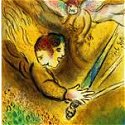
07.16.14 (Tammuz 18, 5774) "You shall send a thousand (אֶלֶף) from each of the tribes of Israel to the war [against the Midianites]" (Num. 31:4). The midrash, however, says that Moses sent 3,000 from each tribe: a thousand soldiers, a thousand to intercede for victory, and a thousand to guard those who prayed... Those in the "prayer squadron" were stationed up at the front of the battle, along with the priests who carried the "war ark" (ארון המלחמה) and who sounded shofars, with the guardians protecting them. Moses arranged the troops this way to demonstrate that the source of Israel's power was the LORD alone. Crying out to God is the way of victory in our battles against darkness...
Integrity of our Words...

[ Our Torah this week (Mattot) discusses various laws regarding vows and oaths... ]
07.16.14 (Tammuz 18, 5774) "If a man vows a vow (i.e., neder: נֶדֶר) to the LORD, or swears an oath (i.e., shevuah: שְׁבוּעָה) to bind himself by a pledge, he shall not break his word. He shall do according to all that proceeds out of his mouth" (Num. 30:2). The Hebrew expression "break his word" literally means "profane his word" (יַחֵל דְּבָרוֹ), that is, to defile the soul by causing it to be inwardly divided, irresolute, and cowardly. After all, breaking your word means violating the integrity of who you are, showing that what you say and what you do are not unified, and this leads to feelings of shame. Your words confess your reality and bring it to life... If you cannot keep your word, your word becomes profane, empty, lost -- you become a "stranger to yourself," unsure of what you intend. "Let your "yes" be yes and your "no" be no; learn to say what you mean and mean what you say.
"I accept upon myself - without a vow - not to excuse any of my actions with a falsehood. Even if this resolution will cause me great shame, I will will accept that shame and will admit to the truth." - Ahavat Meshorim
Note: A "vow" (neder) is a promise to do something (or to refrain from doing something), whereas an "oath" ( sheva') is a sworn testimony that something is true (or false). See the summary page for Parashat Mattot for more information.
Praise and Testing...
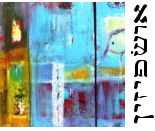
07.16.14 (Tammuz 18, 5774) If you are struggling through a tough day today, or if you feel oppressed or heavy of heart, let me encourage you to praise God anyway... Offering thanks to the LORD is a powerful tool for announcing your faith in God's triumph over the darkness of the present hour. Indeed, God Himself is "enthroned" by the praises (תְּהִלּוֹת) of His people (Psalm 22:3). Therefore the heart of faith will choose to say: "Behold, God is my salvation; I will trust, and will not be afraid; for the LORD God is my strength and my song, and he has become my salvation" (Isa. 12:2).
הִנֵּה אֵל יְשׁוּעָתִי אֶבְטַח וְלא אֶפְחָד
כִּי־עָזִּי וְזִמְרָת יָהּ יְהוָה
וַיְהִי־לִי לִישׁוּעָה
hi·nei · el · ye·shu·a·ti · ev·tach · ve·lo ·ef·chad,
ki · o·zi · ve·zim·rat · Yah · Adonai
vai·hi · li · li·shu·ah

"Behold, God is my salvation; I will trust, and will not be afraid;
for the LORD God (יָהּ יְהוָה) is my strength and my song,
and he has become my salvation."
(Isa. 12:2)

Download Study Card
"Do not be grieved (even over yourself), for the joy of the LORD is your strength" (Neh. 8:10). Affirming the love, goodness, faithfulness, compassion, and salvation of God is a powerful way to defeat the enemy of our souls, who regularly seeks to discourage us. King David constantly asked God to help him in his spiritual struggles. "Though I walk in the midst of trouble (בְּקֶרֶב צָרָה), you preserve my life; you stretch out your hand against the wrath of my enemies, and your right hand delivers me" (Psalm 138:7). "For the enemy has pursued my soul; he has crushed my life to the ground; he has made me sit in darkness like those long dead. Therefore my spirit faints within me; my heart within me is appalled" (Psalm 143:2-3). Though we must fight through the stubborn darkness and yet endure ourselves, "the LORD is near to the brokenhearted and saves the crushed in spirit (Psalm 34:18). Indeed, the Lord God is far greater than your heart's sin and will one day entirely deliver you of sin's effect and influence, and that's a great reason to offer thanks!
The Substance of Hope...

07.15.14 (Tammuz 17, 5774) Have you ever wondered why the exercise of your faith is so important to heaven? The Scriptures say that faith is the "substance" (ὑπόστασις) of hope, the conviction of unseen blessing, and "without faith it is impossible to please God, for whoever would draw near to God must believe that he exists and that he rewards those who seek him" (Heb. 11:6). Faith is its own reward, since believing the truth brings you into alignment with reality. Teshuvah is the response to God's love... Faith confesses that God is your Ultimate Concern, your Supreme Good, the goal and end of all that matters to your heart. Your faith is "more precious than gold," because its heart is your highest blessing, namely, the Divine Presence, the beatific reality, and heaven itself.... God tests our faith to draw our attention to Him (Psalm 119:71); to teach us endurance (Rom. 5:3-5; James 1:4); to upbuild our soul (Jude 1:20); to purify our affections (1 Pet. 1:7), and to glorify God's Name (kiddush HaShem). Life in this world is likened to a school wherein we learn how great God is and how much we are loved, valued, and esteemed precious in His eyes. You must believe that God is your healer, that he will make the crooked things straight, and that you are his beloved child... Faith sees the end in God's unfailing love: The LORD God of Israel says: "And I will lead the blind in a way that they do not know, in paths that they have not known I will guide them. I will turn the darkness before them into light, the rough places into level ground. These are the things I do, and I do not forsake them" (Isa. 42:16).
וְהוֹלַכְתִּי עִוְרִים בְּדֶרֶךְ לא יָדָעוּ
בִּנְתִיבוֹת לא־יָדְעוּ אַדְרִיכֵם
אָשִׂים מַחְשָׁךְ לִפְנֵיהֶם לָאוֹר
וּמַעֲקַשִּׁים לְמִישׁוֹר
אֵלֶּה הַדְּבָרִים עֲשִׂיתִם וְלא עֲזַבְתִּים
ve·ho·lakh·ti · iv·rim · be·de·rekh · lo · ya·da·u
bin·ti·vot · lo · ya·du · ad·ri·khem
a·sim · mach·shakh · lif·ne·hem · la·or
u·ma·a·ka·shim · le·mi·shor
el·lah · ha·de·va·rim · a·si·tim · ve·lo · a·zav·tim

"And I will lead the blind in a way that they do not know,
in paths that they have not known I will guide them.
I will make dark places before them turn to light,
and perverse things into uprightness.
These things I will do, and I will not forsake them."
(Isa. 42:16)

Hebrew Study Card
Prayers of our Words...
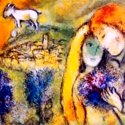
[ The following is related to our Torah for this week, Parashat Mattot, which discusses various laws regarding vows and oaths... ]
07.15.14 (Tammuz 17, 5774) Yeshua warned us to abstain from making any kind of vow or oath since our word alone should be enough (Matt. 5:33-37). He also spoke of "good and evil treasures of the heart" that produce actions that are expressed in our words (Luke 6:45). Our inward motive determines our thinking, which in turn affects the way we act and use words. Therefore He warned: "I tell you, on the day of judgment people will give account for every careless (ἀργὸν) word they speak, for by your words you will be justified, and by your words you will be condemned" (Matt. 12:36-37). Our very salvation is based on confession of the truth, and therefore we must use our words as a means of expressing the love and grace of God (Rom. 10:9; Col. 4:6). We must be on guard to keep away from lashon hara (evil speech) by focusing on what is worthy, lovely, and of good report (Prov. 13:3, Phil. 4:8). As David prayed: "Let the words of my mouth and the meditation of my heart be acceptable in your sight, O LORD, my rock and my redeemer" (Psalm 19:14):
יִהְיוּ לְרָצוֹן אִמְרֵי־פִי
וְהֶגְיוֹן לִבִּי לְפָנֶיךָ יְהוָה צוּרִי וְגאֲלִי
yi·he·yu · le·ra·tzon · im·rei · fi
ve·heg·yon · lib·bi · le·fa·ne·kha · Adonai · tzu·ri · ve·go·a·li

Let the words of my mouth and the meditation of my heart
be acceptable to You, O LORD, my rock and my redeemer.
(Psalm 19:14)

Hebrew Study Card
As image bearers of God, our words likewise are to carry deep meaning and sanctity. Just as God's words are trustworthy, true, and lifegiving, so should be our words and communication. The sages say that the words we speak - whether good or bad - call for a response in the realm of spirit. This is hinted at by the Hebrew word for "thing" (i.e., devar: דָּבָר), which also means "word." Listen to the words of your heart and understand that they are devarim, "things" that are defining the course of your life right now. Our thoughts and words "exhale" the breath of God that was given to each of us. In a very real sense they are "prayers" we are constantly offering... (more here)
May it please the LORD our God to help us use our words for the purpose of strengthening and upbuilding (οἰκοδομὴν) one another (Eph. 4:29). May our words always be gracious and "seasoned with salt" (Col. 4:6). Amen. "Whoever keeps His word, in him truly the love of God is perfected" (1 John 2:5).
Do not lose heart...

07.14.14 (Tammuz 16, 5774) I know many of you are in pain, struggling to hang on to hope, waiting for the fulfillment of the promise of your salvation in Yeshua. Keep the fire of your heart burning, friend... Rabbi Nachman once told a person who was struggling with his faith: "It is written that all creation was brought into being because of people like you. God saw there would be people who would cling to our holy faith, suffering greatly because confusion and doubt would plague them. God perceived that such would overcome these doubts and troubles of heart and remain strong in their belief. It was because of this that God brought forth all creation." Amen. Never yield to despair, since that leads to further darkness and fear. Press on and keep fighting the "good fight" of faith (1 Tim. 6:12). Remember that you infinitely matter to heaven; your life has great value; you are significant and you are truly loved by our Heavenly Father. There is a "future and a hope" reserved for you; there is "a white stone, and on that stone will be written a new name that no one can understand except the one who receives it" (Rev. 2:17). May "the trial of your faith, being much more precious than of gold that perishes, though it be tested with fire, be found to result in praise and glory and honor at the revelation of Yeshua the Messiah" (1 Pet. 1:7).
כִּי אָנכִי יָדַעְתִּי אֶת־הַמַּחֲשָׁבת
אֲשֶׁר אָנכִי חשֵׁב עֲלֵיכֶם נְאֻם־יְהוָה
מַחְשְׁבוֹת שָׁלוֹם וְלא לְרָעָה
לָתֵת לָכֶם אַחֲרִית וְתִקְוָה
ki · a·no·khi · ya·da·ti · et · ha·ma·cha·sha·vot
a·sher · a·no·khi · cho·shev · a·lei·khem · ne·um · Adonai
mach·she·vot · sha·lom · ve·lo · le·ra·ah
la·teit · la·khem · a·cha·rit · ve·tik·vah

"For I know the plans that I have for you, declares the LORD,
plans for blessing and not for evil, to give you a future and a hope."
(Jer. 29:11)

Hebrew Study Card
"I am sure of this, that he who began a good work in you will bring it to completion (ἐπιτελέω) at the Day of Yeshua the Messiah" (Phil 1:6). The LORD is able to guard you (φυλάξαι) from stumbling and to present you blameless before the presence of His glory with great joy (Jude 1:24). "The LORD upholds all who are falling and raises up all who are bowed down" (Psalm 145:14). "He will sustain you to the end, guiltless in the Day of our Yeshua the Messiah" (1 Cor. 1:8). He who calls you is forever faithful; He will surely do it (1 Thess. 5:24). Yea, "the Lord is faithful (נֶאֱמָן הוּא): He will establish you and guard you against the evil one" (2 Thess. 3:3). The Spirit says, "Fear not, for I AM with you always."
Folly and Wisdom...

07.14.14 (Tammuz 16, 5774) "For the word of the cross [i.e., ῾Ο λόγος ὁ τοῦ σταυροῦ - i.e., the meaning of the cross] is folly to those who are perishing..." But why is it regarded it as folly? Surely not because Yeshua died as a martyr for his faith, for even worldly wisdom may acknowledge the nobility of this (for example, when it esteems the death of the pagan philosopher Socrates at the hands of the Athenians). No, the offense of the cross comes from its message that we are helpless and lost apart from divine intervention. The cross is an affront to the aspirations of human reason because it states that through the lowliness and sacrifice of Yeshua - and only through Him - may a person be healed by God; and there is categorically no other way. The cross therefore exposes the sham of so-called worldly wisdom, proving it to be worthless and vain. However, to the person of faith, the cross is "the power of God (גְּבוּרַת אֱלהִים) for those being saved" (1 Cor. 1:18).
The Hebrew word for salvation (i.e., yeshuah: יְשׁוּעָה) comes from a root (i.e., yasha: ישׁע) that means to "make wide," to make "broad," "spacious," or "free [from what blocks or holds in bondage]." The word is used to describe deliverance from Egypt (Exod. 14:13; Deut. 33:29), victory over Israel's enemies (Num. 10:9; Psalm 44:7), release from exile (Isa. 46:13; Ezek. 44:22), and the divine preservation and blessing of the Jewish people (Jer. 14:8). The word is also associated with deliverance from sin and its penalty (Jer. 17:14; Psalm 51:12,14). The LORD God of Israel is called the Savior (Isa. 45:21] - (i.e., moshia [מוֹשִׁיעַ] - from the same root). The Name transliterated as "Jesus" is Yehoshua (יְהוֹשׁוּעַ) in Hebrew, from יְהוָה and יָשַׁע, which means "YHVH is salvation" or "YHVH saves." As it is uttered by the agency of the Ruach ha'emet: אָנֹכִי אָנֹכִי יְהוָה וְאֵין מִבַּלְעָדַי מוֹשִׁיעַ - "I, even I am the LORD, and besides me there is no Savior" (Isa. 43:11).
אָנכִי אָנכִי יְהוָה
וְאֵין מִבַּלְעָדַי מוֹשִׁיעַ
a·no·khi · a·no·khi · Adonai
ve·ein · mi·bal·a·dai · mo·shi·a

"I, even I am the LORD,
and besides me there is no Savior."
(Isa. 43:11)

In this connection, note that some Bible translations print the words of Yeshua in red, though of course we should likewise mark the words of YHVH (יְהוָה), since YHVH is indeed the Moshia' (מוֹשִׁיע) - the Savior and LORD of all....
The Fast of Tammuz...

07.13.14 (Tammuz 15, 5774) According to Jewish tradition Moses shattered the tablets on the 17th day of the 4th month, after he came down from Sinai and found the people worshipping the golden calf. Today, this tragic date is commemorated as a fast day (i.e., the "Fast of Tammuz"), which marks the beginning of a three week period of mourning that culminates on Tishah B'Av (i.e., the date when the people tragically believed the evil report of the spies and were sent into exile).
During this three week period of national mourning, the weekly readings from the prophets are all "Haftarahs of Rebuke" that warn the people about imminent judgment from heaven, and therefore the theme of most Jewish religious services is teshuvah (repentance). In addition, weddings or other joyous events are usually not held during this time of year. Indeed, among the very Orthodox, the last nine days of the three weeks are the most rigorous and solemn. Beginning on the first day of the month of Av, traditional mourning customs are practiced in anticipation of the most solemn fast day of Tishah B'Av, when the Book of Lamentations (Megillat Eichah) is plaintively recited during the evening service.
 |
This year the fast of Tammuz begins at dawn on Tuesday, July 15th and lasts until sunset (Tishah B'Av begins Monday, August 4th and ends Tuesday, August 5th at sunset).
Calendar note: The early Jewish sages said that the Babylonian names for the months (e.g., "Nisan," "Tammuz," etc. ) were adopted during the time of the exile and have been retained as a testimony of God's faithfulness to the Jewish people... They are obviously not meant to honor paganism, as the later sages clearly understood. The modern (Gregorian) calendar likewise has pagan influences, however, and, if you object to the use of Babylonian names in the Jewish calendar, to be consistent, you should likewise object to Roman names of the days of the week (i.e., "Sunday," "sun-day," "Monday," "moon-day," etc.), the names of the months ("January" from "Janus," "February," from februum, a pagan purification ritual, etc.), and so on. Chaverim, we are "in but not of" the world...
Parashat Mattot...
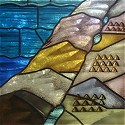
07.13.14 (Tammuz 15, 5774) Last week's Torah portion (Pinchas) ended with a description of the central sacrifice required at the Tabernacle, namely, the daily sacrifice of a male lamb with unleavened bread and wine (i.e., korban tamid: קָרְבַּן תָּמִיד). This ongoing sacrifice portrayed the great Lamb of God, the offering of which represented God's "food," or what "feeds" His heart. In addition to this daily offering, additional sacrifices for Shabbat and the other festivals of the Jewish year were also specified...
This week's Torah reading (Mattot) begins with the LORD giving laws regarding the making of vows (nedarim), that is, promises to do or to refrain from doing something. After these laws were defined, the Israelites were commanded to wage war against the Midianites for seducing the people to sin at the incident of "Baal Peor." During the ensuing battle, the wicked sorcerer Balaam was killed, as well as five tribal kings of the land of Midian. The portion ends with the tribes of Reuben, Gad, and half of the tribe of Manasseh settling east of the Jordan River, in the territories formerly occupied by the Amorites.
Note: The Hebrew word mattot (מַטּוֹת), literally "staffs," is used to stand for tribes. Some of the sages have said the word comes from mateh (מַטֶּה), meaning to "bend" or "incline," as in "he has inclined (הִטָּה) his ear to me" (Psalm 116:2), suggesting that a true leader will take time to listen and know the needs, concerns, and fears of those who follow him. Those who identify with others, empathizing with their sorrows, and comforting their broken hearts, carry the staff of God's leadership...
A Question: Are all vows necessarily bad? What about marriage vows? What about vows to keep faith in the LORD and His promises? We cannot vow not to vow, of course, since that itself is a vow, and indeed, a promise to control our volitional and emotional states is presumptuous. The trouble is not with a vow, in the sense of making a commitment or resolution, however, but rather with the need to make an oath to keep your promise (i.e., to swear), or to appeal to religious or legal ceremony to establish the intention of the heart. Your word should be your bond, though keeping your word requires being honest with yourself. What we need is inner peace to walk in the truth: "God grant me the serenity to accept the things I cannot change; the courage to change the things I can; and the wisdom to know the difference" (Niebuhr).
The Gift of Desperation...
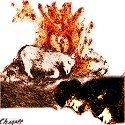
[ The following is related to our Torah for this week, Parashat Pinchas, which describes the daily offering of the lamb as God's "food" (Num. 28:1-8)... ]
07.11.14 (Tammuz 13, 5774) Many of us have been given the "gift of holy desperation." That's the special blessing of needing God so viscerally that you will fall apart or even self-destruct apart from His daily intervention in your life... "Blessed are the poor in spirit, for theirs is the kingdom of heaven" (Matt. 5:3). We groan in hope... Our Torah says that the fire on the altar was to be kept burning at all times (Lev. 6:12-13), which symbolizes esh tamid (אֵשׁ תָּמִיד), or the inner fire of the heart... How blessed it is to be full of the fire of this inner need, this relentless groaning, this constant hunger to be set free. Even more wonderful is how the korban tamid - the daily whole burnt sacrifice of the lamb - represents Yeshua's ongoing and wholehearted passion for you to come alive to God's love...
I love you guys... thank you for being here and for praying for me. I mention you all in my prayers and thank God for you all. Shabbat Shalom!
Keep on Trusting...

07.11.14 (Tammuz 13, 5774) When Yeshua said, "Let not your heart be troubled... I go to prepare a place for you," he was assuring his friends that he had matters well under his control, and therefore they did not need to worry, since his passion rendered their salvation completely secure... The future is a "prepared place" for you, even if life in this world is often marked by testing and refining fires. God has not promised to rescue us according to our own schedule, however, so if it appears that your prayers are not immediately answered, keep waiting in faith... "Rejoice, even if you have been grieved by various trials, because the tested genuineness of your faith -- more precious than gold that perishes though it is tested by fire -- may result in praise and glory and honor at the revelation of Yeshua the Messiah" (1 Pet. 1:6-7). God works all things together for good, and since the exercise of faith is your good, he engineers all things to build your faith. "For my thoughts are not your thoughts, neither are your ways my ways, says the LORD" (Isa. 55:8).
Recall the words: "Let him who walks in darkness and has no light trust in the name of the LORD and rely on his God" (Isa. 50:10). Trusting in God (i.e., bittachon - בִּטָּחוֹן) doesn't mean that we are obligated to say this is "the best of all possible worlds," though it does mean we believe that eventually God will wipe away every tear and make all things right... Bittachon is a word for this world, which says, "Though he slay me, I will trust in him..." Those who call upon the LORD can trust not only in concealed good behind ambiguous appearances ("all things work together for good") but also in a future, real, substantive good that will one day be clearly manifest for us all... We fight the "good fight" of faith, which is a worthy struggle that eventually is realized for blessing. Meanwhile, may the LORD our God keep us from such depth of sorrow that leads to sickness, darkness and despair.
The last promise of Scripture is "I come quickly," and the last prayer is, "Amen, come, Lord Yeshua" (Rev. 22:20). Meanwhile we "inwardly groan" for the fulfillment of our redemption: we are suspended between worlds, walking in hope yet subject to the vanities that befall all flesh. And though God may tarry, He declares, "I am the LORD; in its time I will hasten it" (Isa. 60:22). But still the heart sighs, "Is it time, LORD? Will you now restore the kingdom to Israel?" But as Yeshua said, "It is not for you to know times or seasons that the Father has fixed by his own authority" (Acts 1:6-7). We are left waiting for ultimate God's answer: His glorious coming to fulfill our salvation. Meanwhile God is faithful "to keep you from falling, and to present you faultless before the presence of his glory with exceeding joy" (Jude 1:24). God will help us before He will help us. May He come speedily, and in our day. Amen.
Be Strong, Be Strengthened...
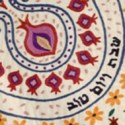
07.11.14 (Tammuz 13, 5774) The central message of the cross of Messiah is that God regards you as personally worth dying for, and indeed, that your life is worth the exchange of His own... You are treasured; you are loved. This is of first importance (1 Cor. 15:3-5). "For God so loved the world, that he gave his only Son, that whoever believes in him should not perish but have eternal life" (John 3:16). We must begin here, first, always....
Your Heavenly Father sees in secret... "The deepest thing in our nature is this region of heart in which we dwell alone with our willingnesses and our unwillingnesses, our faiths and our fears" (William James). It is there, in the secret place of the heart, that the sound of the "knock" is either heard or disregarded (Rev 3:20). May the Lord give us the willingness to do His will and the courage to believe in His love. And may God deliver us from doubt and from every other fear. May we all be strong in faith, not staggering over the promises, but giving glory to God for the miracle of Yeshua our LORD. May we all be rooted and grounded in love so that we are empowered to apprehend the very "breadth and length and height and depth" of the love of God given to us in Messiah, so that we shall all be filled with all the fullness of God. Shabbat Shalom, chaverim!
The Most Important Mitzvah...
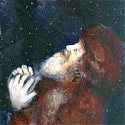
07.11.14 (Tammuz 13, 5774) THE SINGLE MOST IMPORTANT MITZVAH of Scripture is to trust Yeshua as your LORD and Savior. Everything else centers on this. The two "great commandments" are the Ve'ahavta ("Love the LORD with all your heart") and the obligation to love others as yourself (Matt. 22:36-40). These two commandments presuppose, however, that: 1) you believe that the LORD is real, personal, loving, and accessible, and 2) you are in fact able to love the LORD and others in the truth. As I mentioned recently, however, apart from genuine spiritual rebirth and the new life imparted through Yeshua (i.e., chayim chadashim: חַיִּים חֲדָשִׁים), it is literally impossible (οὐ δύναται) to fulfill these commandments. Those who are "in the flesh" cannot please God (Rom. 8:8). Indeed, the principle (νόμος) called the "law of sin and death" (תּוֹרַת הַחֵטְא וְהַמָּוֶת) is invoked whenever someone attempts to draw close to the LORD apart from faith in His appointed Sacrifice and Mediator for sin. The idea that your "good deeds" can merit access to the LORD's Presence and favor is ultimately the negation of the cross. The Apostle Paul warned that those who perverted the message of the gospel by adding any form of "works of law" (מַעֲשֵׂי הַתּוֹרָה) were under a divine curse (Gal. 1:8-9). Yes, it's that serious of an issue...
Trusting in the LORD is foundational to all that may rightly be called Torah. The Talmud (Makkot 23b-24a) says, "Moses gave Israel 613 commandments, David reduced them to eleven (Psalm 15), Isaiah to six (Isaiah 33:15-16), Micah to three (Micah 6:8), Isaiah reduced them again to two (Isaiah 56:1); but it was Habakkuk who gave the one essential commandment: tzaddik be'emunato yich'yeh, literally, "the righteous, by his trust, shall live." In the New Testament (long before the compilation of the Talmud), the apostle Paul had first distilled the various commandments of the Torah to this same principle of faith (see Rom. 1:17, Gal. 3:11, and Heb. 10:38).
Of course we do not impugn the written Torah when we say that God has made a better covenant based on better promises (Heb. 8:6). The LORD is the same yesterday, today, and forever: He is one.... The revelation and grace of God is manifest at Sinai as it is at Zion. What's changed is the covenant -- and our response to that new covenant in light of the full counsel of the Scriptures. An honest reading of the New Testament shows that Paul was not simply rejecting legalism, but any form of work-based salvationism. Israel should have known this, since the Torah (and prophets) prophesied that a new era of "circumcised hearts" would come. Therefore Paul puts forward the idea that salvation by the grace of God is in perfect harmony with the overall teaching of Torah.
Please do not be confused about all this. Torah study is good and we are expected to understand the writings of Moses (and the prophets) and how they reveal Yeshua as the Messiah (Luke 24:27; Acts 3:22). When Paul wrote to the Gentile churches, "All Scripture is breathed out by God and profitable for teaching, for reproof, for correction, and for training in righteousness, that the man of God may be competent, equipped for every good work" (2 Tim. 3:16-17), he was of course referring to the Jewish Scriptures, since the New Testament had not yet been compiled. By all means then should followers of the Jewish Messiah study the Torah of Moses and be aware of how it glorifies the LORD. But Torah study must be informed with the Spirit of Truth (רוּחַ הָאֱמֶת). Yeshua is the central character of the story of redemption, the "Lamb slain from the foundation of the world" (1 Pet. 1:20; Rev. 13:8).
We are commanded to "rightly divide" (ὀρθοτομέω, lit. "cut straight") the "word of truth" (דְּבַר הָאֱמֶת, see 2 Tim. 2:15). Therefore, in order to avoid confusion regarding the relationship between the words of Moses and the words of Yeshua, we must bear in mind that Torah (תּוֹרָה) is a general word that means "instruction" and always is a function of the underlying covenant (בְּרִית, "cut") of which it is part. In other words, Torah is our responsibility to the covenantal actions of the LORD God of Israel. Followers of Yeshua are therefore not "anti-Torah" even if they understand this word in relation to the new and better covenant of God (Heb. 8:6). There is indeed a Torah of the New Covenant, just as there is Torah of the older one. Messianic believers are called to adhere to the instruction of King Yeshua who is the embodiment of all genuine truth from God (John 1:17). The all-important matter is to understand our response to God's covenantal actions as mediated through God's promised Messiah (1 John 5:11-12).
For more on this vital topic, please see "The Most Important Mitzvah..."
Feeding God's Heart...

[ The following entry concerns this week's Torah reading, parashat Pinchas. Please read the Torah portion to "find your place" here. ]
07.10.14 (Tammuz 12, 5774) As I've discussed elsewhere on the site, the great revelation of the Torah at Sinai focused on the giving of the altar to Israel. However -- as our Torah portion this week makes clear-- the central sacrifice upon this altar was the daily sacrifice (i.e., korban tamid: קָרְבַּן תָּמִיד) of a defect-free male lamb with unleavened bread and wine. The LORD calls this "My offering(קָרְבָּנִי), my bread (לַחְמִי)" (Num. 28:1-8). In other words, the service and ministry of the Mishkan (i.e., Tabernacle) constantly foreshadowed the coming of the great Lamb of God (שֵׂה הָאֱלהִים) who would be offered upon the altar "made without hands" to secure our eternal redemption (John 1:29; Heb. 9:11-12).
The sacrifice of the lamb represents "God's food," a pleasing aroma, for it most satisfied the hunger of God's heart (Eph. 5:2). Indeed, Yeshua's offering upon the cross represents God's hunger for atonement, healing from the sickness of death, since it restored what was lost to Him through sin, namely, fellowship with his children. God could never be satisfied until He was able to let truth and love meet (Psalm 85:10).
Sometimes we say that we "hunger for God," but it is vital to remember that it is God who first hungers for us. God desires our love and fellowship. He comes to seek fruit among the trees - but does He find any? He walks in the cool of the day, calling out to us, but are we attuned to hear His voice? Do we accept the invitation to be in His Presence? When God "knocks on the door of your heart" to commune with you, what "food" will you be serving? (Rev. 3:20). Every day we are given an opportunity to "feed God" through expressing faith, hope, and love. Ultimately it is our obedience to the truth is what "feeds" Him: "Behold, to obey is better than sacrifice, and to hearken than the fat of rams" (1 Sam. 15:22).
We "feed God" by offering heartfelt thanks, by walking in faith, by yearning for Him, by studying Scripture, by participating in corporate worship, by giving tzedakah, by performing acts of kindness (gemilut chasadim) for others, and so on (Heb. 13:15-16). Expressing our love for God is the deepest meaning of teshuvah, which is an "answer" or response to His great love for us (1 John 4:19). Just as God feeds and sustains us through His love, so we "feed Him" by our yearning, our prayers, our praise, and our worship... For more on this subject, see "The Hunger of God's Heart."
No Fear in Love...

07.09.14 (Tammuz 11, 5774) While loving God and others is our greatest duty - the "yoke of heaven" - you might be surprised to learn that the most frequent commandment is simply al-tirah, "Be not afraid." Over and over again in the Scriptures we hear the LORD saying to those who trust in Him, al tira (אַל־תִּירָא כִּי עִמְּךָ־אָנִי), "fear not, for I Am with you." This is a word for the exiles of every age: Be not afraid - al-tirah – not of man, nor of war, nor of tribulation, nor even of death itself (Rom. 8:35-39). If God is for us, then who is able to stand against us? "There is no fear in God's love" (φόβος οὐκ ἔστιν ἐν τῇ ἀγάπῃ).
We must press on to secure our high calling in Messiah: "Let us know; let us press on to know (i.e., נִרְדְּפָה, "pursue after") the LORD; His going out is sure as the dawn; He will come to us as the showers, as the spring rains that water the earth" (Hos. 6:3). May God help us pursue him be'khol levavkha - with all our heart - because He has promised, "You will seek me and find me, when you seek me with all your heart" (Jer. 29:13). And may the love of the LORD indeed be upon us, even as we put our hope in Him (Psalm 32:22).
יְהִי־חַסְדְּךָ יְהוָה עָלֵינוּ
כַּאֲשֶׁר יִחַלְנוּ לָךְ
ye·hi · chas·de·kha · Adonai · a·lei·nu
ka·a·sher · yi·chal·nu · lakh

"May your love, O LORD, be upon us,
as we hope in You"
(Psalm 33:22)

Hebrew Study Card
We must train our minds to see beyond mere appearances, to ignore the (fearmongering) messages of this dark world, and to search for God's loving Presence in everything. Walking in trust of God's care for our lives casts out our fears... And (again) may the love of the LORD indeed be upon us, even as we put our hope in Him.
Way of Perfect Peace...

07.09.14 (Tammuz 11, 5774) When we lose sight of the truth that God is in complete control of all things, we tend to grow anxious... Feeling worried comes from focusing on ourselves, a perspective that can make us feel alone, forgotten, and even victimized in this world. Worry moves us to defend ourselves, to seek refuge in our own devices, and to forfeit the will of God according to the dictates of lesser fears... Worry is a place of inner exile and pain. The sages say it is not permitted to worry: "To worry is a sin; only one sort of worry is permissible; to worry because one worries." We should worry that we worry because this indicates our hardness of heart and our unbelief. God's name YHVH (יהוה) means "Presence," "Breath," "Life," and "Love." So why be anxious for "tomorrow"? We really only have this moment, but this moment is entirely sufficient when we walk in the light of God and seek to know him in all our ways (Prov. 3:5-6).
The first part of the Shema (i.e., Deut. 6:4-9) admonishes us to remember the truth of God "when you sit in your house, when you walk in your ways, when you lie down, and when you rise up." "In all your ways know Him," that is, in all that you put your hand to do look for the God's Presence and guidance (1 Cor. 10:31). This is something you must do: As King David stated, "I have set the Lord always before me, because He is at my right hand, I shall not be moved" (Psalm 16:8). "Let the peace of God rule in you" (Col. 3:15).
The Name of the LORD is "I-AM-WITH-YOU-ALWAYS," which implies that we always live within His Presence and care, even if we are sometimes unconscious of this truth (Matt. 28:20). As it is written in the prophets, hen al kapayim hachotikh: "Behold I have engraved you on the palms of my hands" (הֵן עַל־כַּפַּיִם חַקּתִיךְ; Isa. 49:16). Remember the One who stretched out his hands and died for your healing; remember that he said, "Do not be anxious about tomorrow... sufficient for the day is its own trouble" (Matt. 6:34). Again, "do not be anxious for any reason, but in everything by prayer and supplication with thanksgiving let your requests be made known to God, and the healing peace of God (שְׁלוֹם אֱלהִים) - the very shalom of heaven which surpasses all understanding - will guard your hearts and your minds in Yeshua the Messiah" (Phil. 4:6-7). "He's got the whole world in his hand," and we experience inner peace when our minds are settled on Him (Isa. 26:3).
יֵצֶר סָמוּךְ תִּצּר שָׁלוֹם שָׁלוֹם כִּי בְךָ בָּטוּחַ
בִּטְחוּ בַיהוָה עֲדֵי־עַד כִּי בְּיָהּ יְהוָה צוּר עוֹלָמִים
ye·tzer · sa·mukh · titz·tzor · sha·lom · sha·lom · ki · ve·kha · ba·tu·ach
bit·chu · vadonai · a·di-ad · ki · be·Yah · Adonai · tzur · o·la·mim

You will keep him in perfect peace whose mind is stayed on you, for he trusts in you.
Trust in the LORD forever, for Yah the LORD is an everlasting rock.
(Isa. 26:3-4)

Hebrew Study Card
The LORD is Tzur Olamim - the "Rock of Ages" - the very foundation of all possible worlds and the eternal Source of existence. He is the solid ground of all reality!
Very Present Help...
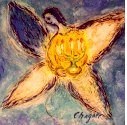
07.08.14 (Tammuz 10, 5774) "For the very hairs of your head are all numbered" (Matt. 10:30). Yeshua was not using "poetic exaggeration" here, but instead affirmed that God's wisdom and knowledge is so vast that it pervades and encompasses all things (including things about ourselves we do not see or understand). God's providence descends to the subatomic dust and ascends to the massive orbs and stars that sweep through the heavens. There is no realm – no possible world – nothing above, below, or around you – that is beyond God's sustaining power and will. All that was, is, and ever shall be is forever under God's sovereign authority, and he rules over all things for his glory and good. There is no "chance" or "coincidence" in God's universe; nothing is beyond his reach and purposive design. Therefore we can remain at peace even in the midst of the world's turmoil and storms: God is always here, always working for your ultimate healing and good. He is "your refuge and strength, a very present help in trouble. Therefore we will not fear though the earth gives way, though the mountains be moved into the heart of the sea, though its waters roar and foam, though the mountains tremble at its swelling. Selah."
אֱלהִים לָנוּ מַחֲסֶה וָעז
עֶזְרָה בְצָרוֹת נִמְצָא מְאד
עַל־כֵּן לא־נִירָא בְּהָמִיר אָרֶץ
וּבְמוֹט הָרִים בְּלֵב יַמִּים
יֶהֱמוּ יֶחְמְרוּ מֵימָיו
יִרְעֲשׁוּ־הָרִים בְּגַאֲוָתוֹ סֶלָה
E·lo·him la·nu ma·cha·seh va·oz
ez·rah ve·tza·rot nim·tza me·od
al ken lo ni·ra be·cha·mir a·retz
u·ve·mot ha·rim be·lev ya·mim
ye·he·mu yech·me·ru me·mav
yir·a·shu ha·rim be·ga·a·va·to Se·lah

"God is our refuge and strength,
an everpresent help in trouble.
Therefore we will not fear though the earth gives way,
though the mountains be moved into the heart of the sea,
though its waters roar and foam,
though the mountains tremble at its swelling. Selah"
(Psalm 46:1-3)
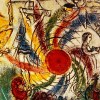
According to many of the Jewish sages, Psalm 46 concerns the birth pangs of the Messianic Age and the prophetic war of Gog and Magog (Ezek. 38-39) that will usher in the Kingdom of God during the End of Days. This is hinted at in the opening of the psalm, where it is written, "Of the sons of Korach: according to alamot (עֲלָמוֹת)," i.e., the "hidden things" or "ages" to come. Recall that the sons of Korach were miraculously delivered from the rebellion of Korach in the desert and therefore they foreshadow the community of Israel delivered at the end of the present age. God is our refuge and strength during perilous days - so "hide yourself for a little moment, until the indignation will have passed" (Isa. 26:20).
God is a very present help in times of trouble, so "if from there [i.e., the trouble of the latter days] you shall seek the LORD your God with all your heart, you will find him, if you seek Him with all your heart and with all your soul" (Deut. 4:29-31). The sages say that machaseh (refuge) implies being protected by God, while 'oz (strength) implies being empowered by God to withstand afflictions that originate from the hand of man. During the time of tribulation, God will grant both to His people. God is our help during distress, "very available," that is, very much present both in quality (i.e., His full Presence) and in quantity (i.e., He is ever-present, or always present). Fear is not an option for the heart of faith, since God gives providential help during time of our need (Heb. 4:16).
Ultimately any true help comes from the LORD Yeshua, of course, who will deliver Israel from all her enemies at the end of the great tribulation period (i.e., at His second coming). It is interesting that the sages say that the word "very" (i.e., me'od: מְאד) in the phrase, "a very present help" is thought to be an acronym for Messiah, Adam, David (מָשִׁיחַ אָדָם דָוִד) - that is, to the "Messiah, son of man and son of David," who will wield the authority of both the first man as well as God's chosen regent upon the earth...
We will not fear - even though the earth will change due to the mighty wars between the nations - and even if the mountains themselves are moved into the heart of the sea -- a prophetic allusion to the return of Yeshua upon the Mount of Olives at the end of the tribulation (Zech. 14:4). Despite the "rage and foam" of the nations, the LORD will break their godless pride as our Messiah returns with the multitude of His servants to exact vengeance upon the enemies of God (Zech. 14:5). "And the LORD will be king over all the earth. On that day the LORD will be one and his name one" (Zech. 14:9). Amen, and may that great Day come soon!
Echoes from the Future...
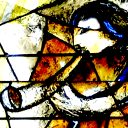
07.08.14 (Tammuz 10, 5774) Yeshua forewarned of the alienation and moral sickness that would pervade mankind just before the time of his return: "Because lawlessness (i.e., ἀνομία, from -α ('not') + νομος, 'torah') will be increased," he said, "the love of many will grow cold (i.e., ψύχομαι, 'be extinguished')" (Matt. 24:12). Note the link between Torah and love: true love requires respect for God's authority, for without that the divine image is disfigured and desecrated. Likewise the Apostle Paul foresaw that the "End of Days" (אַחֲרִית הַיָּמִים) would be a time of peril (καιροὶ χαλεποί) because people would become increasingly narcissistic, self-absorbed, infatuated with their own sense of self-importance, abusive toward others, disrespectful to elders, ungrateful, heartless, unforgiving, without self-control, brutal, treacherous, and so on (2 Tim. 3:1-4). Therefore, in light of the spiritual war that rages all around us, it is vital that we remain firmly rooted in what is real by taking hold of our identity and provision as children of God. "God has not given us the spirit of fear, but of power (גְּבוּרָה / δύναμις) and of love (ἀγάπη), and of a "sound mind" (σωφρονισμός), i.e., a "delivered" mind -- centered and "healed" from inner chaos (2 Tim. 1:7). The name of the LORD (יהוה) means "Presence," and in Him "we live and move and have our being" (Acts 17:28). He is as close as our heart and our very breath (Rom. 10:8). We are not to be troubled like the world that lives in terror of man, nor are we to crave security from the vain devices of mere men. No - we must look to God Almighty, the Master of the Universe. He alone is our Refuge and Defense, the One who gives us steadfast love in the midst of these storms. "Let not your heart be troubled" - God is in control of the whirlwind, friends...
According to Jewish eschatological tradition, the period of time immediately before the Messiah's arrival is sometimes called ikvot meshicha (עִקְּבוֹת מְשִׁיחַ), the time when the "footsteps of the Messiah" can be heard. Some of the "signs" of this period include the rise of various false prophets, numerous wars and "rumors of wars" (including the rise of Magog), famines, earthquakes, worldwide apostasy from the faith, persecution, and a globalized sort of godlessness that is revealed in unbridled selfishness, greed, chutzpah (audacity), shamelessness, and a general lack of hakarat ha-tov (gratitude). The greatest sign, however, will be that Israel will exist once again as a sovereign nation, despite the prophesied exile among the nations (Deut. 4:27-31; Jer. 30:1-3). For more on this fascinating subect, see the article "Birthpangs of Messiah."
Rich Toward Heaven...
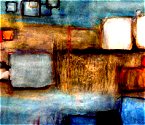
07.08.14 (Tammuz 10, 5774) From our Torah portion this week (i.e., Pinchas) we read: "For the many you shall make much his inheritance, and for the few you shall make small his inheritance: each according to his number will be given his inheritance" (Num. 26:54). The sages comment this refers not only to the tribes and their allotment in the land, but also to one's individual share in the world to come (אִישׁ לְפִי פְקֻדָיו יֻתַּן נַחֲלָתוֹ). The "many" refers to one who attends to the Divine Presence and is rich toward heaven, whereas the "few" refers to those who cheat themselves out of their eternal future by making themselves poor toward heaven. Life in the world to come is therefore determined by the investment you are making here, today (1 Cor. 3:8-15; Col. 3:24). The fool lays up treasure for himself on earth and neglects his heavenly calling, but the wise one is "rich toward God" (Luke 12:16-21). "Therefore do not throw away your confidence, which has a great reward" (Heb. 10:35).
Made Safe in God's Love...

07.07.14 (Tammuz 9, 5774) Al tira ki imekha ani - "Fear not, for I am with you..." This is the way out of fear – to understand that God is "with you," that he is drawing you near, and that he is as close as your next breath... Being "with" God is to bound up in his love, identified with his purposes, visions, and expectations. Knowing that God is "with you" (עִמָּנוּ אֵל) delivers you from disappointment, and you can then find courage "to be with yourself," regardless of the vexation of your past. You no longer need to defend yourself; you are free to forgive others (including yourself), you can show compassion to yourself, and even laugh at yourself. May the LORD God set you free from all your fears and grant you peace to accept who you are, and to abide in the comfort that God unconditionally loves and welcomes you in Yeshua...
אַל־תִּירָא כִּי עִמְּךָ־אָנִי אַל־תִּשְׁתָּע כִּי־אֲנִי אֱלהֶיךָ
אִמַּצְתִּיךָ אַף־עֲזַרְתִּיךָ אַף־תְּמַכְתִּיךָ בִּימִין צִדְקִי
al ti·ra ki im·me·kha a·ni; al tish·ta ki a·ni E·lo·he·kha
im·matz·ti·kha af a·zar·ti·kha, af te·makh·ti·kha bi·min tzid·ki

"Fear not, for I am with you; be not dismayed, for I am your God;
I will strengthen you, I will help you,
I will uphold you with my righteous right hand."
(Isa. 41:10)

Download Study Card
How do you think God regards you? Does he see your sin first? If you think he disapproves of you, it's likely you will attempt to earn his approval by doing certain things (and not doing others), which puts you "under the law," that is, the never-ending cycle of self-justification. But you will never feel safe as long as you regard God's acceptance of you as conditional, since you will only be as secure as your own best efforts, a project that will exhaust you in the end. Instead you must know yourself as truly loved by God, just as the "prodigal son" came to know his father's unconditional love and acceptance despite his many misdeeds (Luke 15:11-32). The incarnation of Yeshua means that God "runs to meet and embrace you," regardless of whatever happened in your life that made you run away from home. And whatever else it may be, sin is the separation from God's love, but Yeshua made the decision to die for your sins before you were born. Your sin cannot overrule God's surpassing and personal love for your soul, since God gave up his very life for you to find life.
The Hebrew word for "life" is chayim (חַיִּים), a plural noun that contains two consecutive letter yods (יי) that picture two "hands held together" (the Hebrew word yad [יָד] means "hand"), or the union of our spirit with God's Spirit. The word itself reveals that there is no life apart from union with God, who extends his hand to you and says, "Live in me" (John 15:4). We live in him by faith, receiving our daily bread his very real presence (John 6:53). Yeshua is the Source of all life, and we find nourishment, strength, and fullness of joy in his life. The Lord is our light and our salvation, the Mediator of divine life (Psalm 27:1; John 1:4). As it is written, "Whoever has the Son has the life; but whoever does not have the Son of God does not have the life" (1 John 5:12).
The Lord is also called "the God of breath" (Gen. 2:7; Num. 16:22). The Hebrew word for breath is ruach (רוּחַ), a word that means both "spirit" and "wind." God is as close as your breath and surrounds you like the unseen yet encompassing air. Since God's name YHVH (יהוה) means "Presence" (Exod. 3:13-14), "Life" (Deut. 30:20), and "Love" (Exod. 34:6-7), he is the Beloved, the "I-am-with-you-always" lover of your soul. So fear not; you are never really alone. Yeshua breathes out to you and says, "Receive the Holy Spirit" (John 20:22).
True and False Zeal...
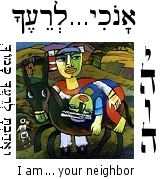
[ The following entry concerns this week's Torah reading, parashat Pinchas. Please read the Torah portion to "find your place" here. ]
07.07.14 (Tammuz 9, 5774) You may be entirely sincere in your convictions, but you may be sincerely wrong... In the time of the Second Temple, for instance, the Zealots despised the rule of Rome. Their political hatred caused them to blindly regard anyone who didn't share their passion as a personal enemy. In one of the great tragedies of Jewish history, these zealots actually killed more Jews than did the Romans themselves! And how many Christians these days "kill" relationships with other believers because of their particular zeal regarding some doctrinal question? I am not suggesting that doctrine is unimportant, of course, but before you pick up that sword to do the business of Pinchas, you might do well to consider your heart's attitude...
We need to be careful with our passions. There is a "false zeal" that leads to estrangement and confusion. Withholding love from others is ultimately grounded in an appeal to God as the administrator of Justice. It is an appeal to God as Elohim (אֱלהִים), not as YHVH (יהוה), the Compassionate Source of Life. If we insist on our rights, we appeal to principles of justice, i.e., to God as the Lawgiver. But if we intend to have God be the Judge of others, we must appeal to Him to be our own Judge as well. If we have an unforgiving spirit toward others, we will not be forgiven (Matt. 6:15); if we are judgmental toward them, we ourselves will be put on trial; if we are cruel and ungiving toward them, we will experience life as hellish, miserable and mean. This reciprocal principle of Kingdom life appears throughout Jesus' teaching. According to your faith, be it done unto you (Matt. 9:29).
Note: For more on this important topic, see "Parashat Pinchas: God's Greater Zeal."
Pinchas and Isaac...
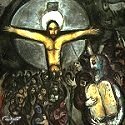
[ The following entry concerns this week's Torah reading, parashat Pinchas. Please read the Torah portion to "find your place" here. ]
07.07.14 (Tammuz 9, 5774) The name "Phinehas" (i.e., Pinchas: פִּינְחָס) shares the same numeric value (gematria) as the name "Isaac" (i.e., Yitzchak: יִצְחָק), which suggests that just as Isaac was willing to be sacrificed in obedience to God (i.e., during the Akedah), so Pinchas was willing to die for his zeal. Note further that Pinchas' passion turned away the wrath of God and established a covenant of an "eternal priesthood" (כְּהֻנַּת עוֹלָם), a phrase that shares the letter value as the word be'acharit (בְּאַחֲרִית), a term that means at the "end of days" (Gen. 49:1; 1 John 2:18). To string this together, we see a connection between Isaac and Pinchas, both of whom picture Yeshua our Messiah. Isaac is a picture of the Lamb of God, of course, and Pinchas pictures the zeal that grafts the heart into the everlasting priesthood of God. The Hebrew gematria reveals that the priesthood of Yeshua that brings everlasting peace is the "end of days" priesthood for humanity, and there is no other. Just as Pinchas was "grafted in" to the priesthood of Israel, so those who belong to Messiah are "grafted in" priests for the end of days, chaverim...
כִּי־קִנְאַת בֵּיתְךָ אֲכָלָתְנִי
וְחֶרְפּוֹת חוֹרְפֶיךָ נָפְלוּ עָלָי
ki · ki·nat · be·te·kha ·a·cha·la·tni
ve·cher·pot · cho·re·fe·kha · na·fe·lu · a·lai

"For zeal for your house has consumed me,
and the reproaches of those who reproach you have fallen on me.
(Psalm 69:9)
Parashat Pinchas - פינחס
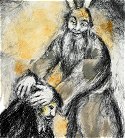
[ The following entry concerns this week's Torah reading, parashat Pinchas. Please read the Torah portion to "find your place" here. ]
07.06.14 (Tammuz 8, 5774) Last week's Torah portion (Balak) concerned the evil King Balak and the wicked prophet Balaam, but this week's portion is about the heroic zeal of Pinchas (Phinehas), the late-born grandson of Aaron the priest, to whom the LORD awarded a brit kehunat olam (בְּרִית כְּהֻנַּת עוֹלָם), a "covenant of a perpetual priesthood." As I hope you will see, Pinchas pictures the Messiah Yeshua, and the covenant of priesthood given to him is a picture of the greater priesthood after the order of Malki-Tzedek.
Jewish tradition says that when Aaron and his sons were commissioned as the exclusive priests of Israel (Exod. 40:12-15), the office applied only to themselves and their future descendants. Since Aaron's grandson Pinchas had already been born at the time the promise was given, however, he did not automatically receive this honor, especially since his father Eleazar (the son of Aaron) was married to an "outsider" -- namely, the daughter of Yitro (also called Putiel, Exod. 6:25). This explains Rashi's statement that the other tribes mocked Pinchas. How dare this "son of an outsider" kill a nassi (prince) of Israel (i.e., Zimri), especially since Pinchas' mother was regarded as an idol worshipper! The LORD honored Pinchas' zeal, however, and overruled the tribalism of the Israelites, and he was therefore elevated to be a priest with special honor before the LORD.
God looks at the heart, chaverim, and is able to make those who have zeal for Him true priests of the LORD! You don't have to be born Jewish to impress the LORD God of Israel, since He's "no respecter of persons" (Rom. 2:11). Not only can He create spiritual children of Abraham from the stones of the ground (Matt. 3:9; Luke 3:8), but He can turn someone considered a non-Jew (by the rabbis, anyway) into a highly honored priest of Israel (1 Pet. 2:9-10). Indeed, many descendants of Pinchas later became the most faithful of the High Priests of Israel during the First Temple period.
Note that according to one midrash, when Zimri and Cozbi (the Midianite princess) were cavorting, they actually ran inside the Tabernacle compound itself, directly past Moses and the people who were weeping at its entrance (Num. 25:6)! Pinchas then took a spear from the Tabernacle guards and followed after them. When he caught up with them within the Tent of Meeting itself, he pierced them through (Num. 25:7-8). After this, thousands of men from the tribe of Simeon ran in after him, seeking to kill him. Pinchas was in such a state of terror that "his soul left him" and the souls of Nadav and Abihu (Aaron's deceased sons) entered his body -- and by this means he became a Kohen.
Parashat Pinchas (like parashat Emor in Leviticus) also includes mention of all of the (sacrifices of the) mo'edim (holidays) given to Israel (Num. 28). These include the daily (tamid), weekly (Shabbat), monthly (Rosh Chodesh) sacrifices, as well as the sacrifices assigned to the special holidays: Passover, Shavuot, Rosh Hoshannah (Terumah), Yom Kippur, Sukkot and Shemini Atzeret. Remembering the joys of the Temple and the special celebrations of the Jewish people are thought to add a contrast to the otherwise somber time of reflection during the Three Weeks of Sorrow.
Prayer for this hour...

07.04.14 (Tammuz 6, 5774) Many of us are hurting, Lord, and we sometimes feel alone in our pain and struggle... This world seems so senseless, so brutal, and so evil at times; we feel powerless, overwhelmed, and even sick inside... We look to You, O LORD our God, and for your mercy and power. Help us to accept what we cannot change and to completely trust in Your great healing, despite the sickness of the world around us. Remind us that though we cannot change the world, we are given grace to sustain our trust in You, our glorious and merciful Healer. And may we never be ashamed; may we never grow bitter; may our sorrows lead us from strength to strength. And may this time of testing lead us to greater wisdom, to compassion, and finally back to You. Amen.
Shabbat shalom dear friends... and thank you for helping me keep this ministry going!
Practice the Presence...
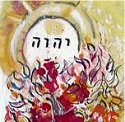
[ The following entry concerns this week's Torah reading, parashat Balak... ]
07.04.14 (Tammuz 6, 5774) "I have sinned, for I did not know that you stood in the road against me" (Num. 22:34). The sages comment that ignorance of the Divine Presence is not a legitimate excuse. The whole world is filled with God's glory, though this awareness is suppressed because of sin. Ignorance (literally the "state of ignoring" moral and spiritual truth) is a choice for which we are responsible (Rom. 1:18-20). Sin blinds us to our eternal responsibility. The antidote to ignorance is to become mindful, awake, and aware... We must choose to attend to God's Presence, as David said, "I have set the LORD always before me" (Psalm 16:8). King David knew, of course, that God was always present, all-seeing, all-knowing, and all-powerful, yet he consciously turned to God in heartfelt humility. David "practiced the presence" of the LORD by realizing that all taht he said, did, and even thought was before the Presence of the Master of the Universe.
שִׁוִּיתִי יְהוָה לְנֶגְדִּי תָמִיד
כִּי מִימִינִי בַּל־אֶמּוֹט
shiv·vi·ti · Adonai · le·neg·di · ta·mid
ki · mi·mi·ni · bal · e·mot

"I have set the LORD always before me;
because he is at my right hand, I shall not be shaken."
(Psalm 16:8)

Hebrew Study Card
To repair the breach between "faith" and "practice," to unify his heart and its affections, David determined to "set" the LORD before him. Note that the verb "set" here is piel, that is, intensive... We must intently focus our mind and heart to regard ourselves as in the Presence of God; we must sense His eye upon us and "know before Whom we stand." The sages say that when David wrote these words, he was referring to the scroll of Torah which he kept tied to his arm (shel yad). King David literally "set" the Word of the LORD upon his right hand to help him keep focused.
Personal Update: I am really sick with the flu and am taking some prednisone to help with my asthma. Thank you for your prayers for refuah shelemah, a complete healing. Shalom.
Perfected Strength...

07.04.14 (Tammuz 6, 5774) "Have you not known? Have you not heard? The Eternal One, the LORD, is the Creator of the ends of the earth (בּוֹרֵא קְצוֹת הָאָרֶץ). He does not faint nor grow weary; his understanding is unsearchable. He gives power to the faint, and to him who has no might he increases strength" (Isa. 40:28-29). Human reason has no objection that God can impart strength, but it objects that strength is found in those who are broken and weary, that is, to the "poor in spirit" who mourn over their lives... And yet it is so: God gives strength to the weary, to the faint, to those who are at the end of themselves: "My power is made perfect (τελειοῦται) in weakness" (2 Cor. 12:9). Man's way is to seek charisma, to esteem those who have natural beauty, charm, or special talents, whereas God's way is first to break us, to make us weaker and weaker, so that he can then fill us with the miraculous divine nature (2 Cor. 4:7). Like all sacrifices that were brought to the altar, we must pass through death to life by means of our union with the Messiah at the cross... It is only after the cross that it may be said, "It is no longer 'I' who lives; now it is Messiah who lives His life in me." There is indeed strength, power, and victory – but such comes after we reckon carnal energy as useless. Indeed, the word "Hebrew" (עִבְרִי) means one who has "crossed over" (עָבַר) to the other side, as our father Abraham did (Gen. 14:13). It is on the other side of the cross that we experience the very power that created the universe "out of nothing" (i.e., yesh me'ayin: יֵשׁ מֵאַיִן) and that raised Yeshua the Messiah from the dead. "Not by might, nor by power, but by My Spirit, says Adonai Tzeva'ot."
נתֵן לַיָּעֵף כּחַ
וּלְאֵין אוֹנִים עָצְמָה יַרְבֶּה
no·tein · la·ya·ef · ko·ach
u·le·ein · o·nim · otz·mah · yar·beh

"He gives power to the faint,
and to him who has no might he increases strength"
(Isa. 40:29)
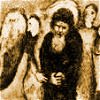
Download Study Card
Note that the word translated "strength" in this verse (otzmah) comes from the same root for "bones" (עֲצָמוֹת). This alludes to the vision of the "dry bones" being clothed with life at the time of resurrection. "Thus says the Lord God to these bones: 'Behold, I will cause breath to enter you, and you shall live'" (Ezek. 37:5). If God has the power to give life to dessicated bones, surely his resurrection power can "quicken us" through the life of our beloved Savior Yeshua who said, "You will receive power (i.e., koach: כּחַ) when the Holy Spirit has come upon you, and you will be my witnesses" (Acts 1:7). Indeed you can do "all things" through Messiah who strengthens you (Phil. 4:13).
Wounds of a Friend...

07.04.14 (Tammuz 6, 5774) "Surely he has taken up our sicknesses and has carried our sorrows; yet we regarded him as stricken, beaten by God and afflicted. But he was pierced (profaned) for our transgressions; he was crushed for our perversions; upon him was the correction that brought our peace, and by his blows we are healed" (Isa. 53:4-5). In this famous passage that foretold the suffering of Yeshua as Mashiach ben Yosef, note that the word translated "blow" (i.e., chaburah: חַבּוּרָה, "wound" or "stripe") comes from the same root as the word for "friend" (i.e., chaver: חָבֵר), and therefore we can read "in His friendship we are healed." Yeshua gave up His life for us so that we could become his friends... As he later said regarding his sacrifice: "Greater love has no one than this, that one lay down his life for his friends" (John 15:13). Indeed of Yeshua it may truly be said, Yesh ohev davek me'ach – "there is a friend who sticks (davek) closer than a brother" (Prov. 18:24).
Life from the Dead...

07.03.14 (Tammuz 5, 5774) "Though the outer man perishes..." yet we must not judge by external appearances, since our faith is based on an unseen good: "I am the resurrection and the life (אֲנכִי הַתְּקוּמָה וְהַחַיִּים); whoever believes in me - though he die - yet shall he live, and everyone who lives and believes in me shall never die. Do you believe this?" (John 11:25-26). Your faith in God's promise allows you to transcend moments of testing: sickness, perils, even death itself, to establish the reality of your trust. Yes, the physcial body will die (Heb. 9:27), but this too is yet another moment to receive the promise of eternal life. Live in God's name; die in God's name: He is on the other side of the veil, preparing a place for you (John 14:3). "For if we live, we live to the Lord, and if we die, we die to the Lord. So then, whether we live or whether we die, we are the Lord's" (Rom. 14:8).
"So we do not lose heart. Though our outer man perishes, our inner man is being renewed day by day. For this light momentary affliction is preparing for us an eternal weight of glory beyond all comparison, as we look not to the things that are seen but to the things that are unseen. For the things that are seen are transient, but the things that are unseen are eternal. For we know that if the tent that is our earthly home is destroyed, we have a building from God, a house not made with hands, eternal in the heavens.... So we are always of good courage. We know that while we are at home in the physical body, we are away from the Lord, for we walk by faith, not by sight" (2 Cor. 4:16–5:7).
It is no small thing to believe the message of Yeshua, and indeed, it involves a passionate inwardness that scandalizes the rational mind. Our father Abraham is extolled as the model of righteous faith, but he was tested to sacrifice the moral law (e.g., "thou shalt not murder") when he lifted up the knife to slay his beloved son Isaac. Faith requires you to change your everyday thinking, to go beyond natural expectations, to "walk on water." In the case of Yeshua, we are confronted with the "Absolute Paradox," namely, the God-Man, the Infinite-made-Finite, the Holy-made-Profane, the Sinless-made-Sin, who says to you: "I AM the resurrection and the life. Whoever believes in me, though he die, yet shall he live, and everyone who lives and believes in me shall never die. Do you believe this?" (John 11:25-26). You will never die; you will never hunger; you are made whole through my brokenness; you will be cleansed by my defilement, and so on. It's not just hard to believe, it's impossible, which is why it is a miracle of God to be saved (Matt. 19:26). "It is the Spirit that gives life; the flesh is no help at all" (John 6:33). The difference is Yeshua: Salvation is of the LORD. We are enabled to love and know God by means of his inner life and spirit, not by means of good intentions or religious zeal. Faith itself is a miracle, the power of God....
Some people imagine spirituality as a climb upward, an "ascent of the soul" that aims to reach God through the performance of good deeds or religious rituals. But God does not say "at the end of the way you will find me," but rather, "I AM the way, the very road under your feet, the Place (הַמָּקוֹם) where you are, the Bridge to the Father (John 14:6). "For all things come from You (כִּי־מִמְּךָ הַכּל), and from your hand we give to you" (1 Chron. 29:14). The LORD is Present in every "here" and every "now," the Source of all we are. And no matter what our circumstances, we will find God if we search "bekhol levavkha" - with all our being, as it is written: "You will seek me and find me, when you seek me with all your heart."
Blessing of Inner Peace...

07.03.14 (Tammuz 5, 5774) It is remarkable that the traditional morning blessing recited at synagogues around the world begins with words attributed to Balaam, the enigmatic and self-styled prophet: Mah Tovu: "How lovely are your tents, O Jacob; your dwelling places, O Israel!" (Num. 24:5). The sages say that the word "tent" (אהֶל) refers to the inner life – how we really feel inside – whereas the word "dwelling" (מִשְׁכָּן) refers to the outer life - our place or circumstances. Together, the inner and the outer mark the quality of our lives, but the inner is the starting point, since we must first learn to live in peace with ourselves. This is vital: we must first tolerate our shortcomings and practice compassion toward our frail humanity... This is sometimes called shalom ba'bayit, "peace in the home" (of the self). Such inner peace is the greatest of blessings, since without it we will cling to pain, fear, and anger, thereby making us unable to find our place at the table in God's kingdom of love.
מַה־טּבוּ אהָלֶיךָ יַעֲקב
מִשְׁכְּנתֶיךָ יִשְׂרָאֵל
mah · to·vu · o·ha·le·kha · Ya·a·kov
mish·ke·no·te·kha · Yis·ra·el

"How lovely are your tents, O Jacob,
your dwellings, O Israel"
(Num. 24:5)

Note: For more on this, see the Mah Tovu Blessing pages.
Curses turned to Blessings...

[ In our Torah portion this week (Balak), we read how Balaam intended to curse the Israelites, but God "took hold of his tongue" and made him bless the people instead... ]
07.03.14 (Tammuz 5, 5774) God can turn curses into blessings... For example, Joseph was blessed despite the ill-will of his brothers: "You devised evil against me, but God devised it for good" (Gen. 50:20). Note that the same Hebrew verb (i.e., chashav: חשׁב) is used to describe both the evil intent of the brothers and the good intent of the Lord. This teaches us that God overrules the malice of men to effect his own good purposes, and therefore we can rightfully affirm gam zu l'tovah (גַּם זוּ לְטוֹבָה), "this too is for good" (Rom. 8:28). Underlying the surface appearance of life (chayei sha'ah) is a deeper reality (chayei olam) that is ultimately real, abiding, and designed for God's redemptive love to be fully expressed. Resist the temptation, therefore, to judge by mere appearances. Forbid your troubles to darken the eye of faith. Do not unjustly judge God's purposes or try to understand His ways. As the story of Balaam shows, God makes even the wrath of man praise Him (Psalm 76:10). "Then God opened Balaam's eyes, and he saw the Angel of the LORD (מַלְאַךְ יְהוָה) standing in the way, with his drawn sword in his hand. And he bowed down..." (Num. 22:31). Indeed, every knee will bow to the LORD our God and Savior (Isa. 45:22-23; Phil. 2:10-11).
We find comfort that the schemes of the wicked are subject to the sovereign purposes of the LORD our God. Ein od milvado (אֵין עוֹד מִלְבַדּו) - there is no power that can be exercised apart from God's consent and overarching will... Indeed all authority on heaven and earth belongs to Yeshua, the "the Ruler of the Kings of the earth" (עֶלְיוֹן לְמַלְכֵי־אָרֶץ). As it is written, "All the nations you have made shall come and worship before you, O Lord, and shall glorify your name" (Psalm 86:9).
Personal Update: I am really sick with the flu over here - fever, congestion, coughing, etc. I am having trouble breathing and my asthma is very severe. Please remember me in your prayers, dear friends. Thank you so much.
Abiding in Him...

07.02.14 (Tammuz 4, 5774) Yeshua used the allegory of a vine and its branches to illustrate how we are to be spiritually connected to Him: "I am the true Vine, and you are the branches," he said (John 15:1-6). The purpose of the branch is to be a conduit of the life of the vine. We derive our identity, life and strength from being made part of Yeshua's life, His vision, and His purposes... In Hebrew, this idea is called devakut (דְּבָקוּת) which means "cleaving" to God bekhol-levavkha (בְּכָל־לְבָבְךָ), "with all your heart," and bekhol-nafshekha (בְּכָל־נַפְשְׁךָ), "with all your soul," and bekhol-me'odekha (בְּכָל־מְאדֶךָ), "with all your being..." Cleaving to God is the essence of the great commandment to love the Lord given in the Shema. We are able to so cleave to God in Yeshua because God does a miracle and gives us lev chadash, a new heart to serve Him. We love Him because He first loved us (1 John 4:19). Whether Yeshua is living in you (and you are living in Him) is the most important question of your life upon which everything else ultimately depends. He appeals to each heart of faith: "Live in me, and I will live in you" (John 15:4).
The Star Still Leads...
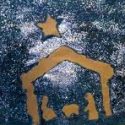
[ The following entry concerns this week's Torah reading, parashat Balak... ]
07.02.14 (Tammuz 4, 5774) Darakh kokhav mi'Yaakov: "There shall come a star out of Jacob..." Amazingly, Balaam – who may have been the forebear of the "magi of the east" (Matt. 2:1-2) – foresaw the coming of the Messiah: "I see him, but not now; I behold him, but not near: a star shall come out of Jacob (כּוֹכָב מִיַּעֲקב), and a scepter shall rise out of Israel" (Num. 24:17). Balaam's prophecy described the coming of the Messiah and his reign in two distinct aspects: "A star from Jacob shall lead the way (i.e., דָּרַךְ)," this refers to Messiah's first coming as the way of life (John 14:6), "and a scepter shall ascend (וְקָם שֵׁבֶט) from Israel," this refers to Messiah's second coming to establish the kingdom after the final redemption. Here is the Hebrew prophecy for you to hear:
אֶרְאֶנּוּ וְלא עַתָּה
אֲשׁוּרֶנּוּ וְלא קָרוֹב
דָּרַךְ כּוֹכָב מִיַּעֲקב
וְקָם שֵׁבֶט מִיִּשְׂרָאֵל
er·e·nu · ve·lo · at·tah
a·shu·re·nu · ve·lo · ka·rov
da·rakh · ko·khav · mi·ya·a·kov
ve·kam · she·vet · mi·yis·ra·el

"I see him, but not now;
I behold him, but not near:
a Star shall come out of Jacob,
and a Scepter shall rise out of Israel"
(Num. 24:17)

Our High Calling...

07.01.14 (Tammuz 3, 5774) The way we "see" is profoundly influenced by how we hear.... The Midrash Rabbah says that the ear (אזֶן) gives life to all the organs of the body. How so? By listening (שׁמע, shema) to the Torah. This idea is repeated in the New Testament: "Faith comes from listening to the Word of God" (Rom. 10:17). It is the Word of God (דְּבַר־אֱלהִים) that is our very life, chaverim, and therefore all the more reason should we treasure it.
Just as our hearts are said to be mikdash me'at (מִקְּדָשׁ מְעַט), a little sanctuary for the Kingdom of heaven (Luke 17:29; Rom. 14:17), so each of us is given a unique sphere of influence that is to be yielded to God's authority as His divinely appointed regent and priest. The question remains: We will rule over our own inner kingdom in agreement with what God expects of His kings and queens, or will we forfeit our responsibilities?
The kingdom of God centers upon the Presence and glory of God, of course. We are called a "kingdom of priests" (Rev. 1:5; 5:10). The Hebrew word for "priest" (i.e., kohen: כּהֶן) comes from a root (כּהנ) that suggests drawing the Spirit of Life near or close to another, or "mediating" the Divine Presence. We can see that through the grammatical structure of the word itself. When the letter Kaf (כּ) is prefixed to a word, it can mean "like" or "as." The letter Hey (ה) serves as a demonstrative (i.e., a pointer), sometimes used to refer to the "hand" or Spirit of God, and the letter Nun (נ) represents freedom and life. In the Torah, the role of the priest was to help people draw near to God. As priests of the New Covenant, our role is to help one another draw close to our Savior and King Yeshua, and to encourage us to stay on the path (Heb. 3:12-14). There is no hierarchy among the true followers of the Messiah, since we are all one body (1 Cor. 12:12-26). Such is our high calling, chaverim, that we should live as "priests" to one another, serving one another and encouraging one another to press on, to never, ever give up hope... Shalom.
|



